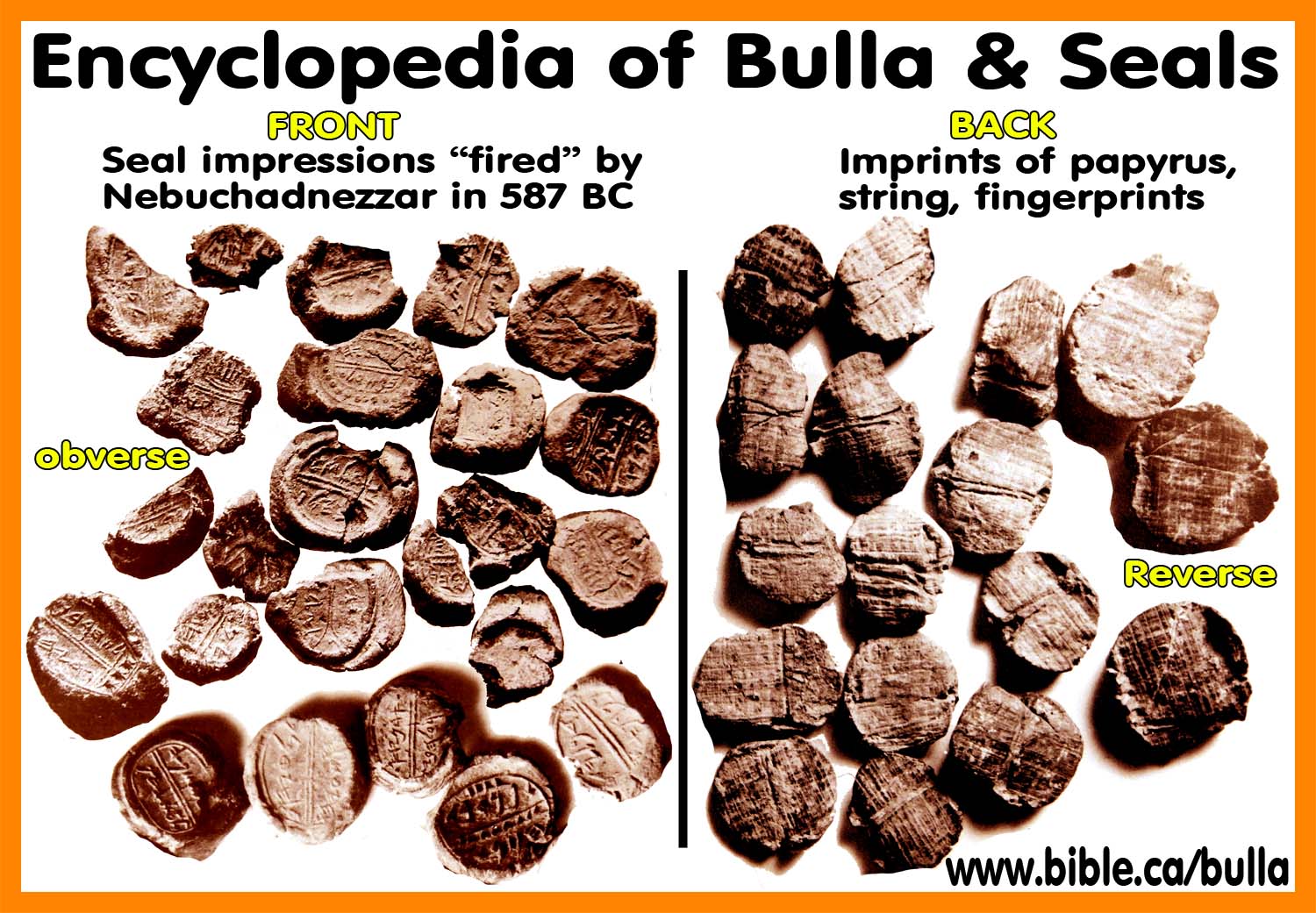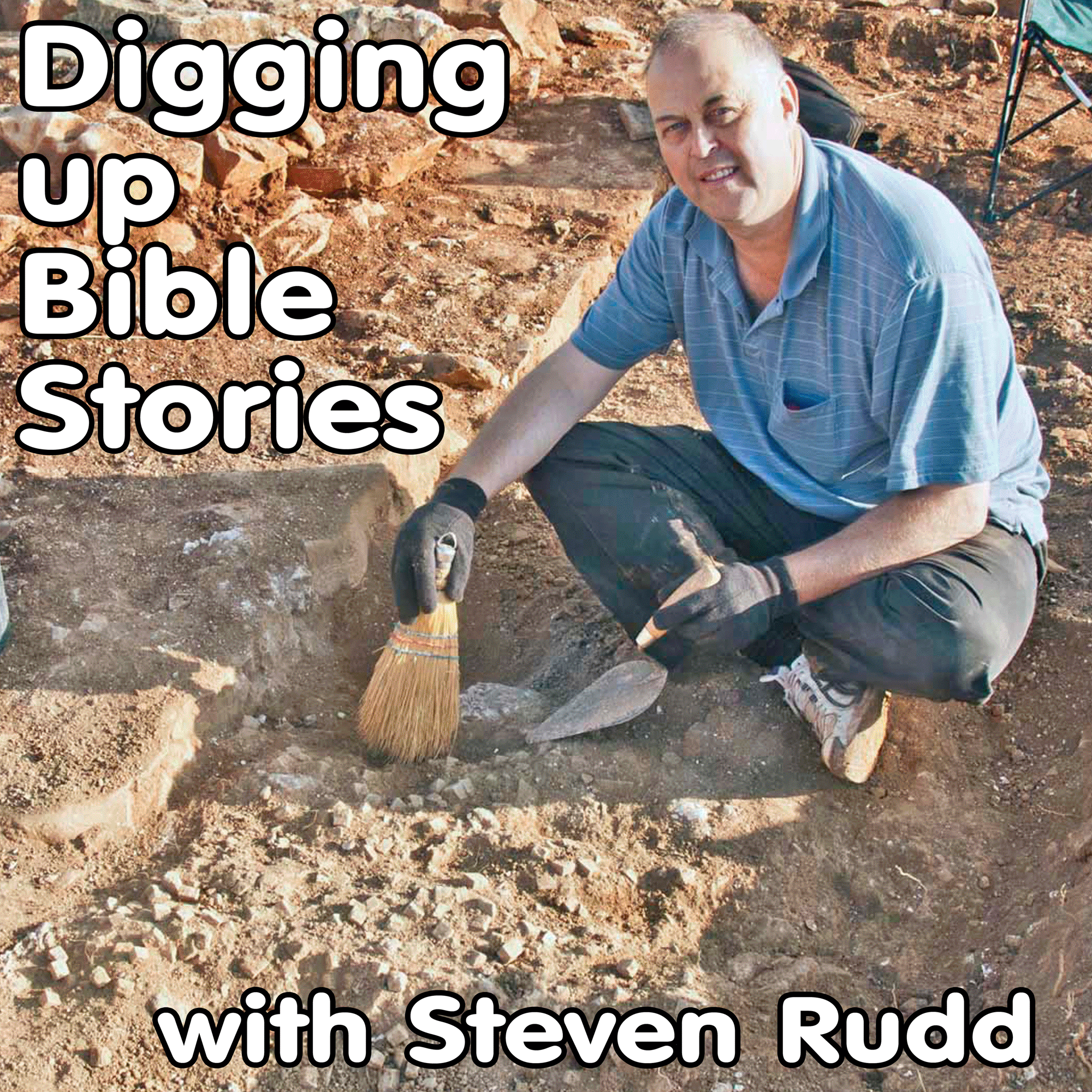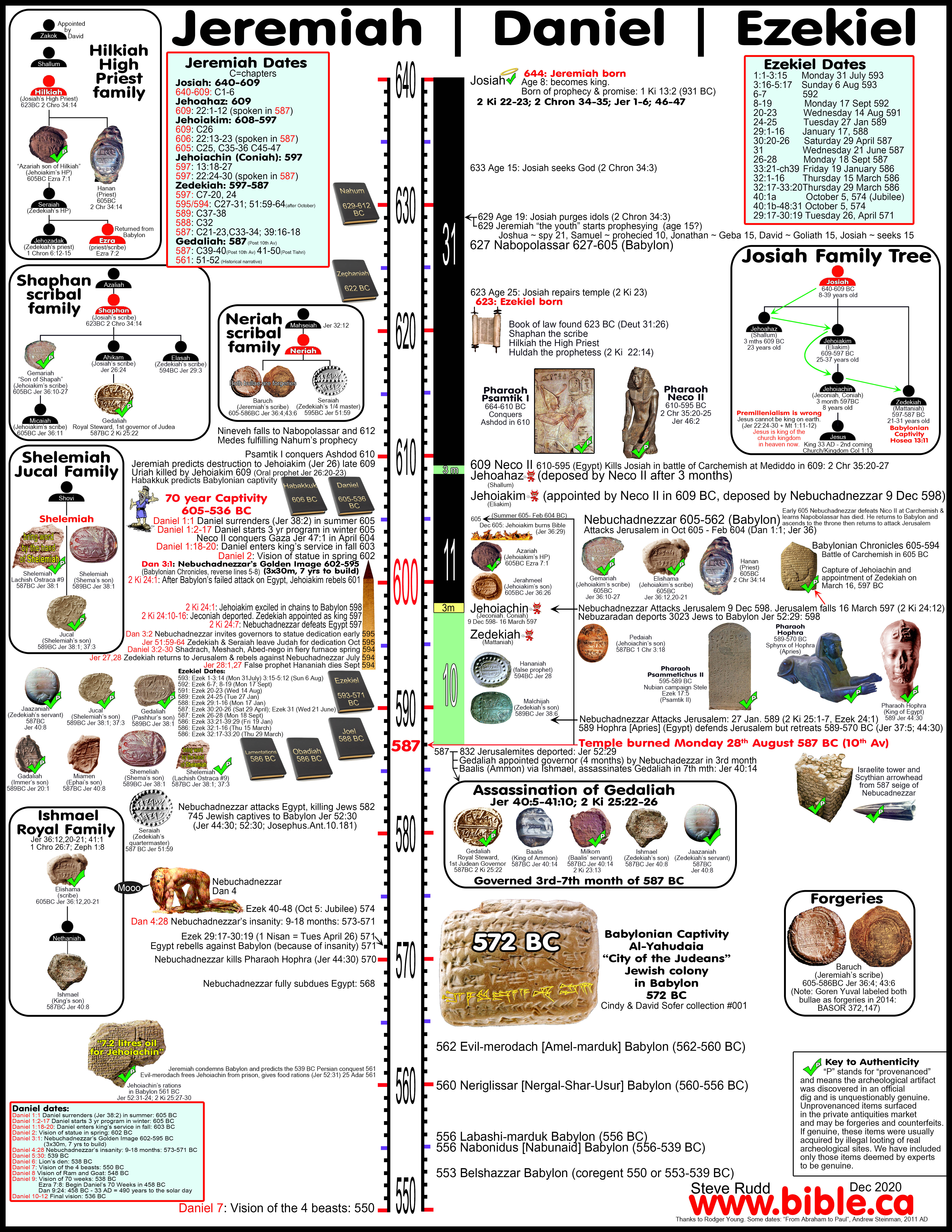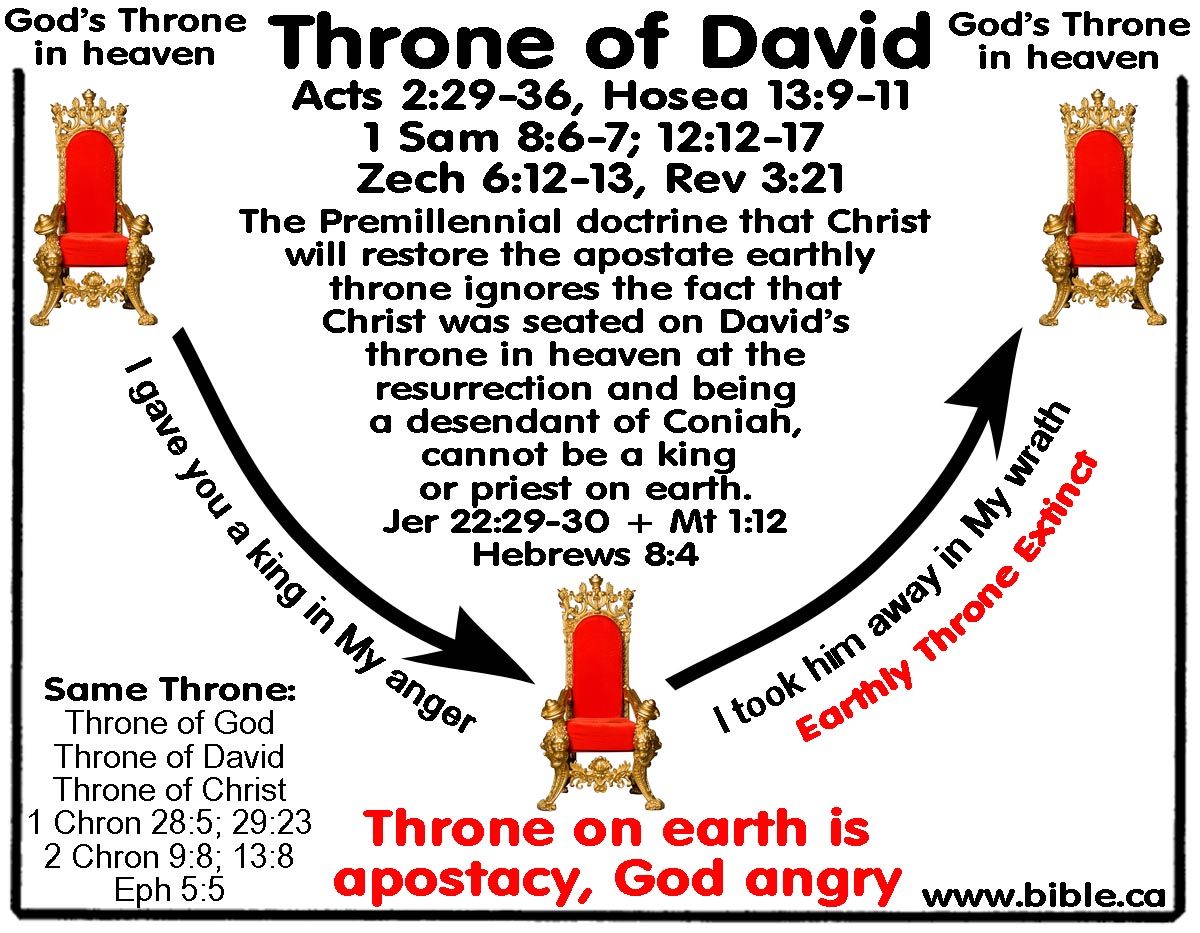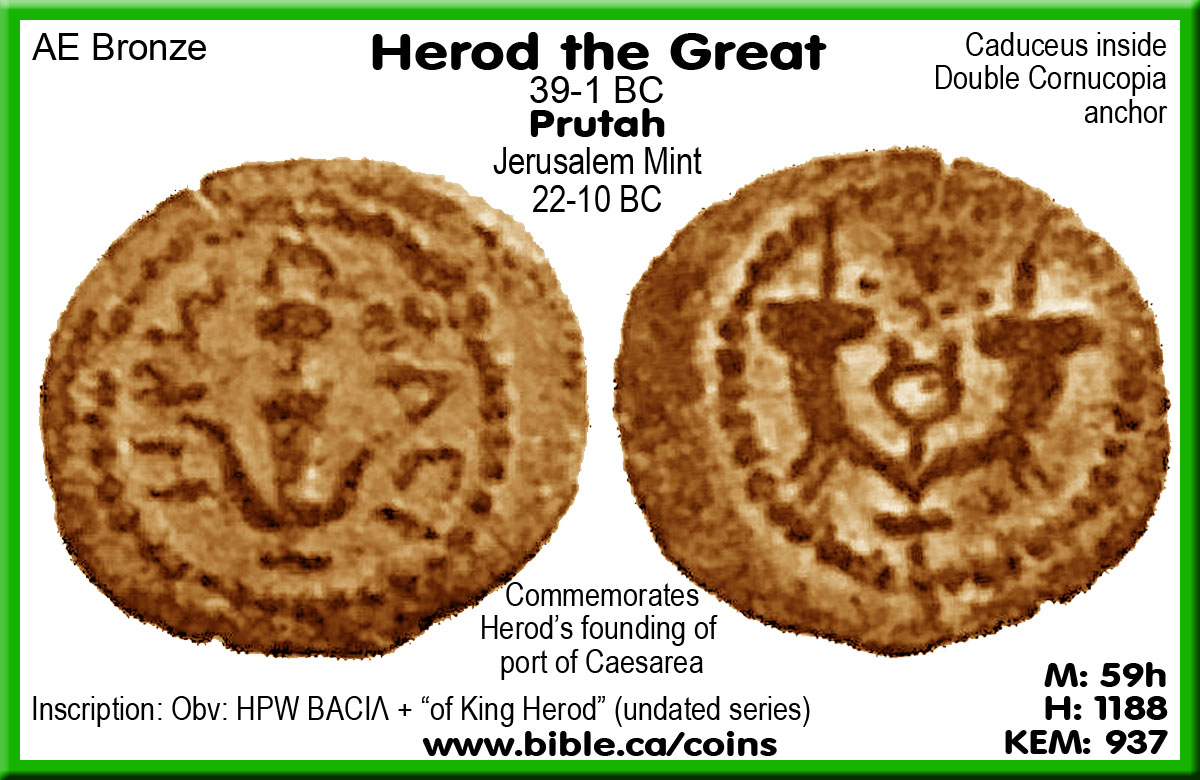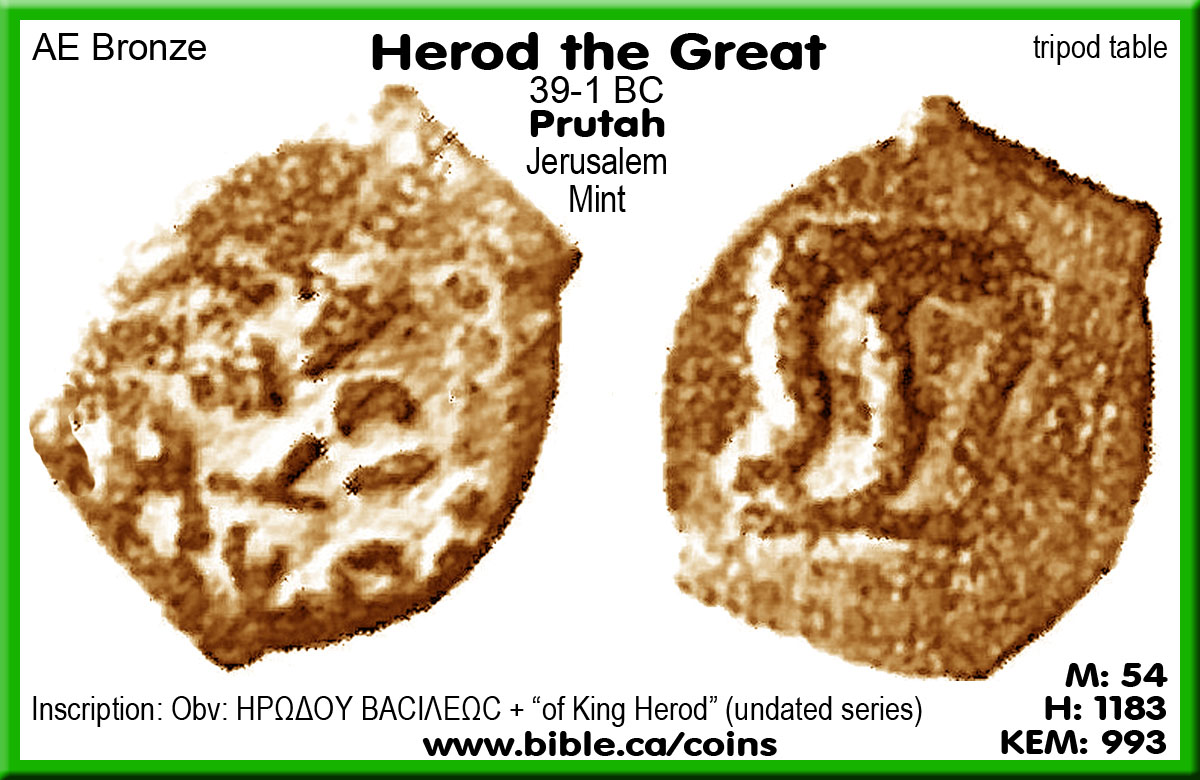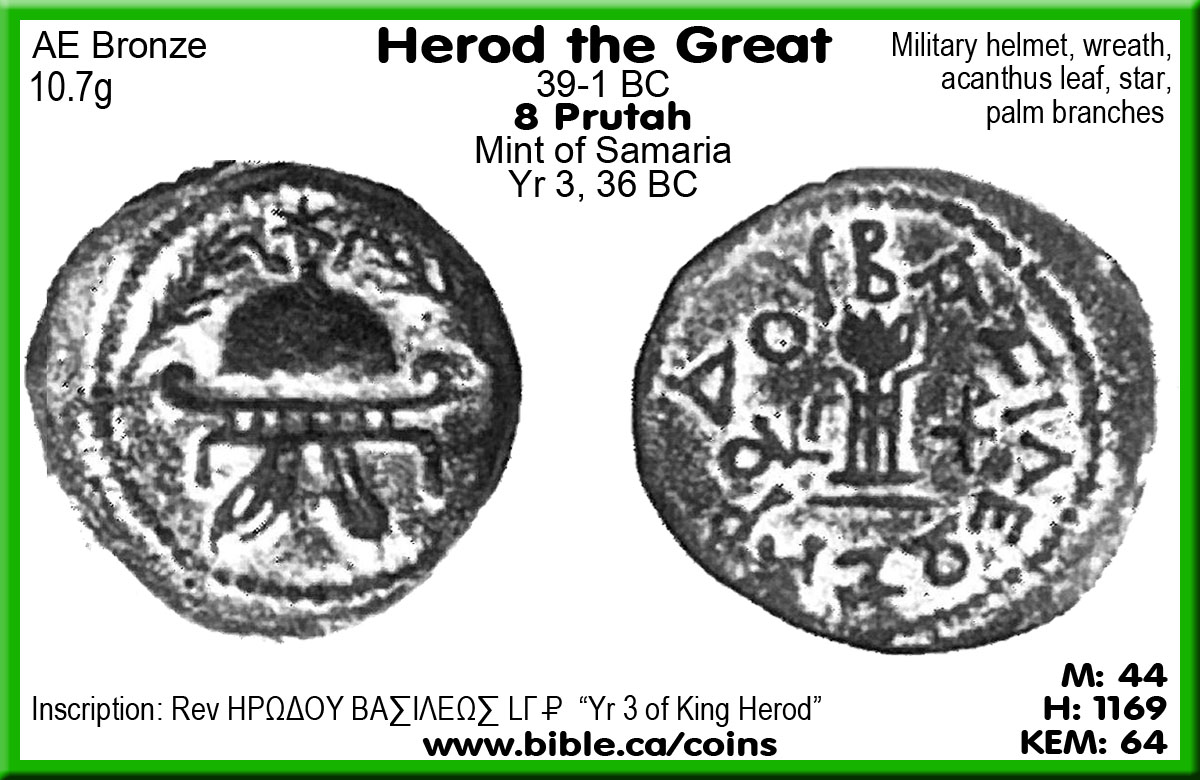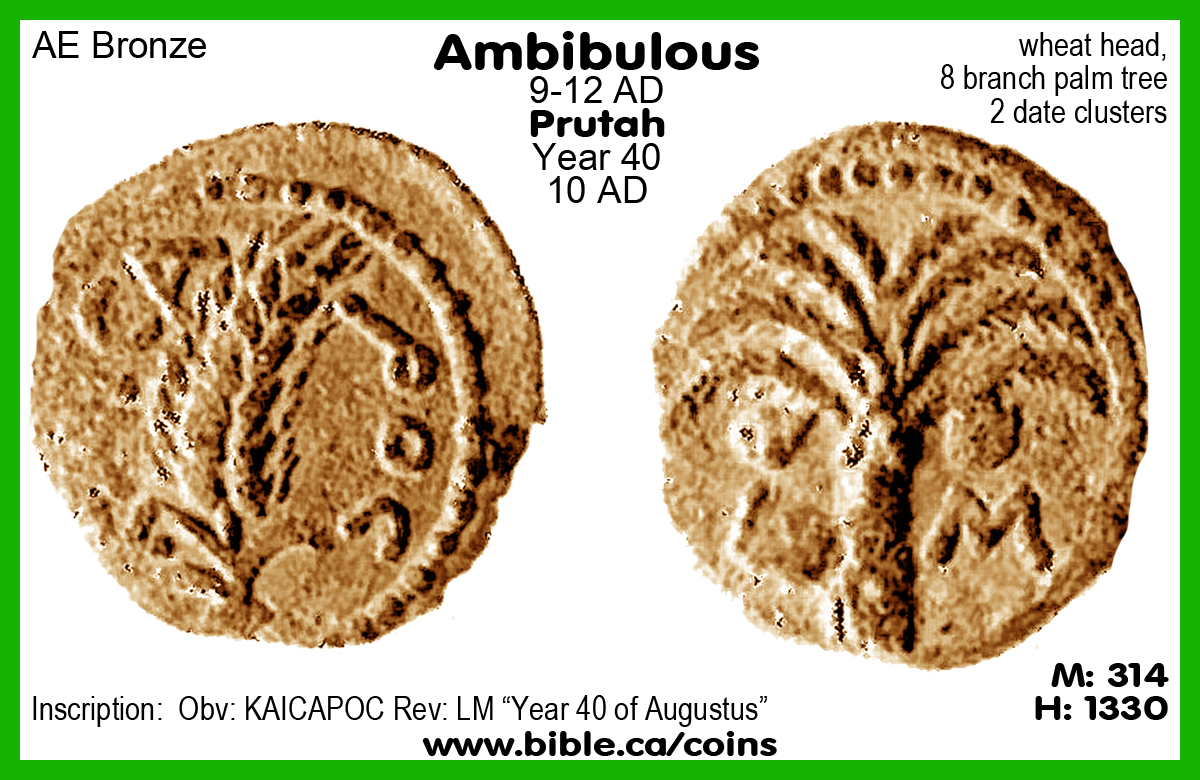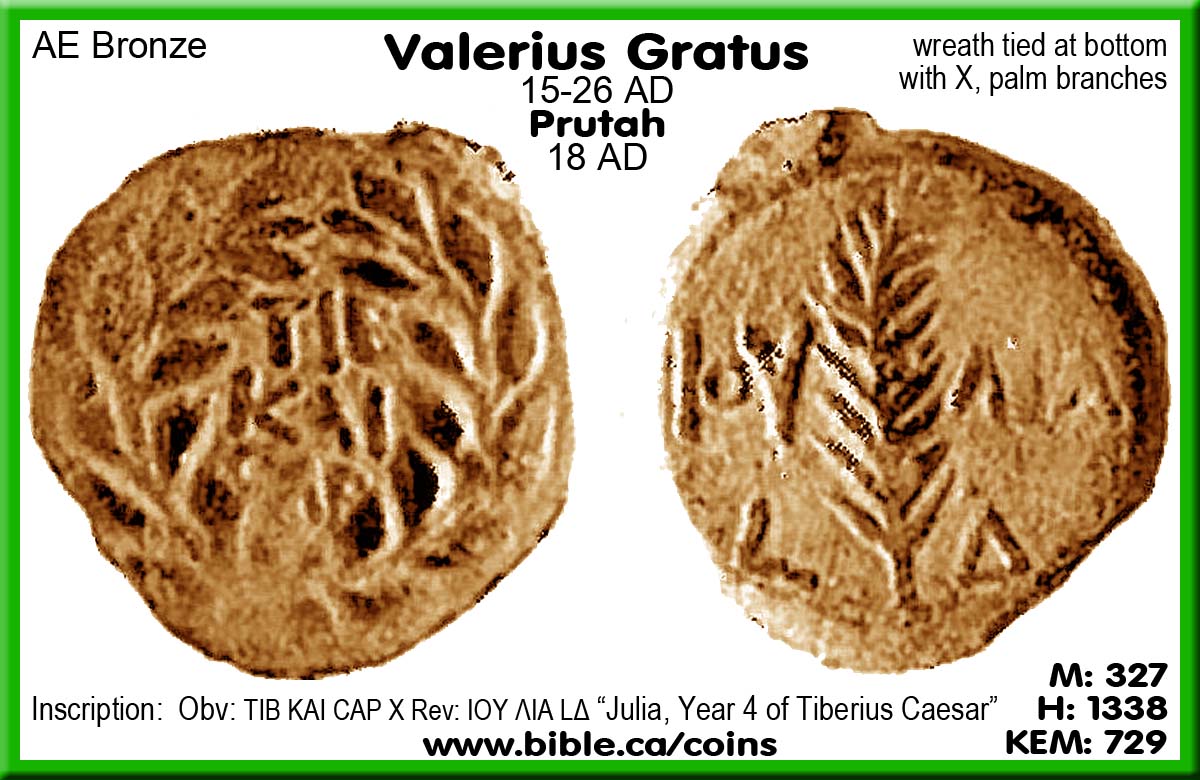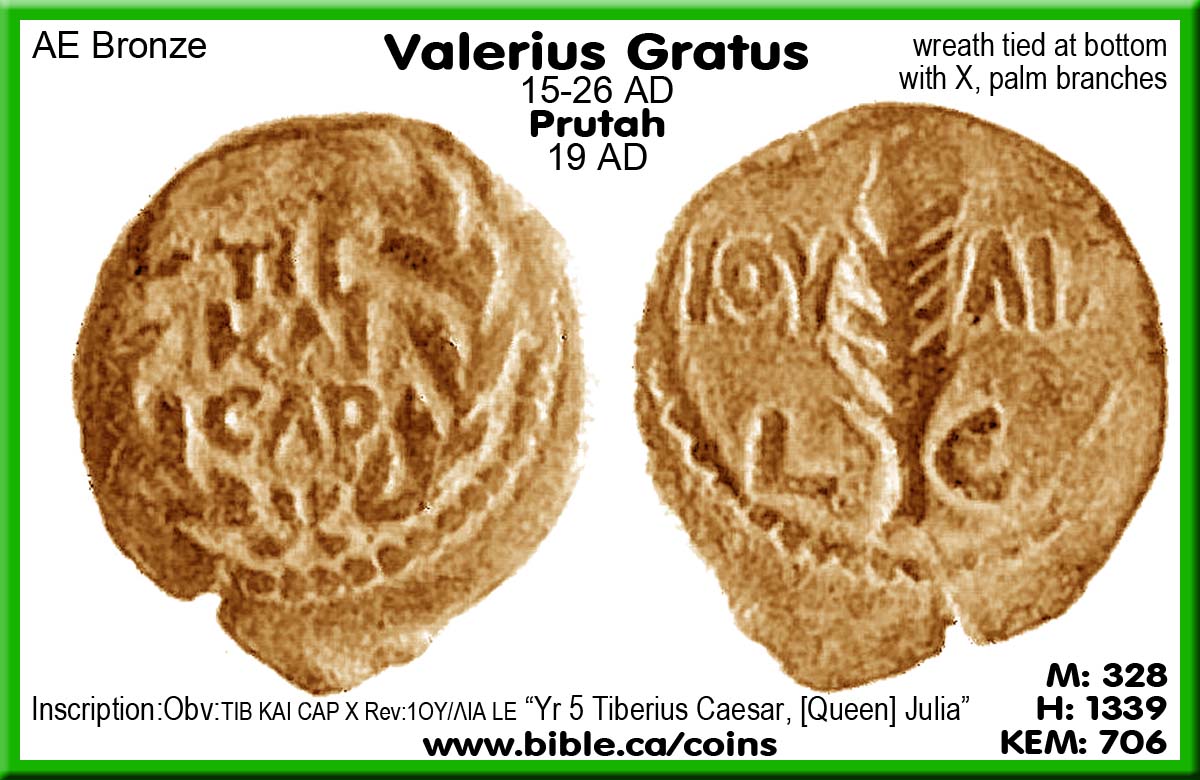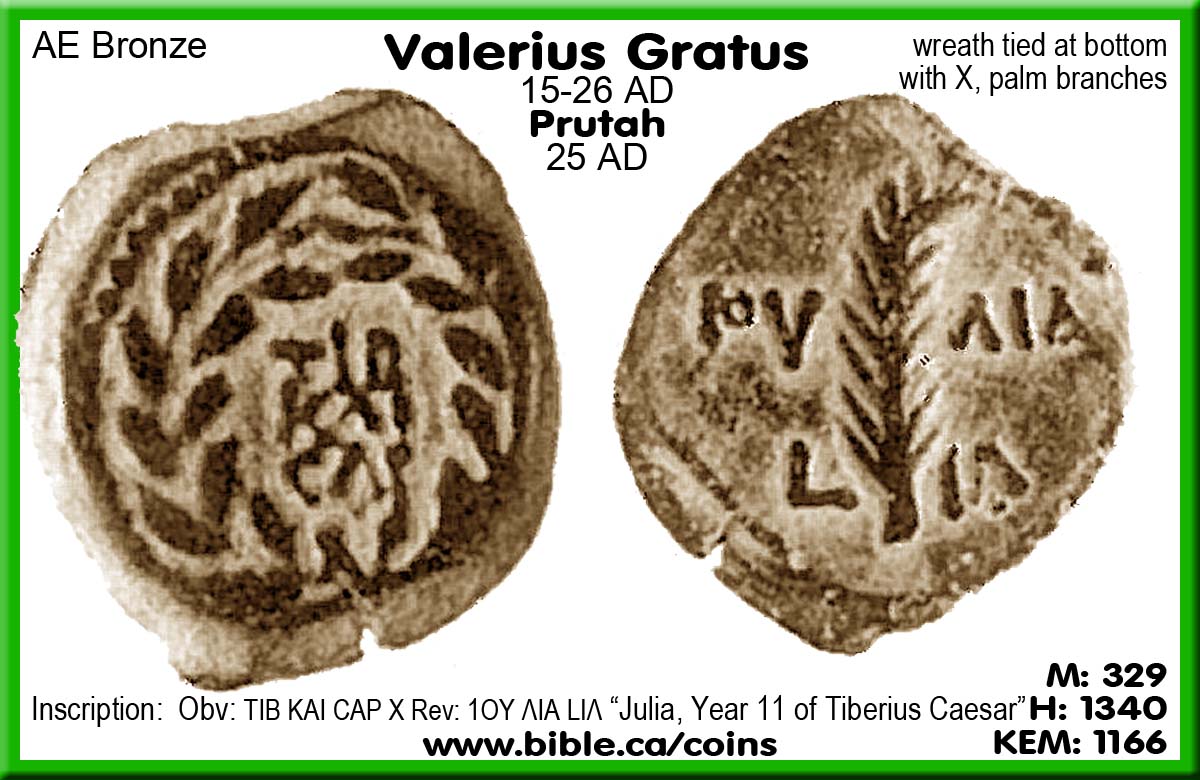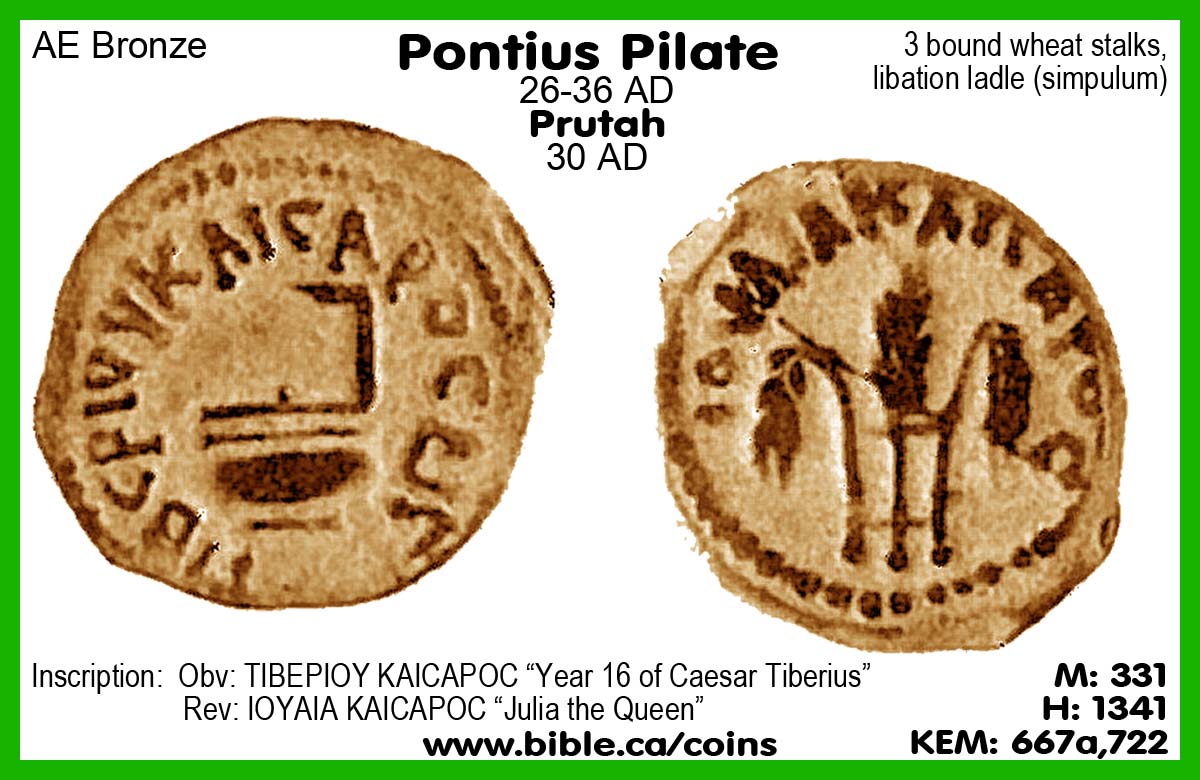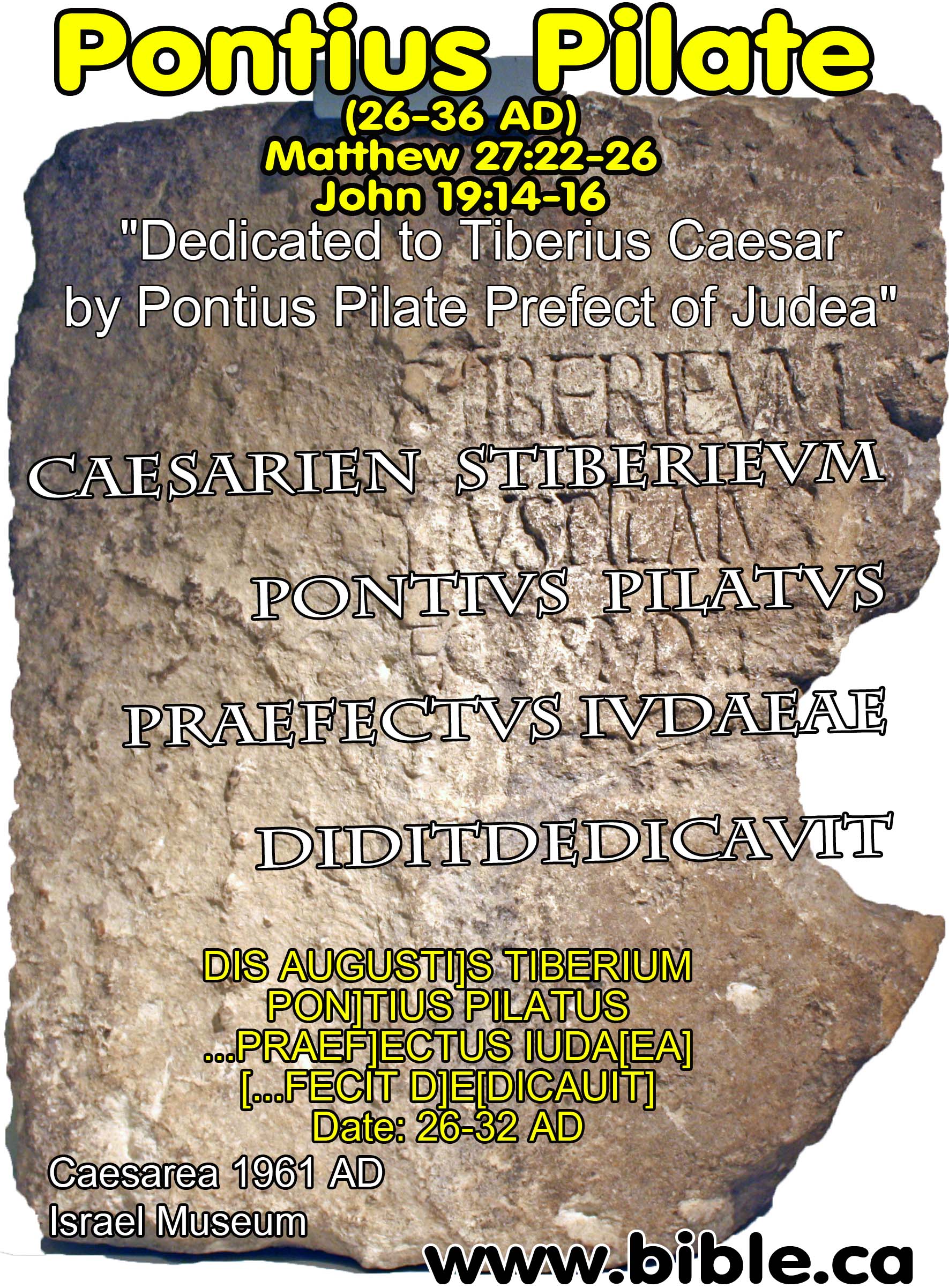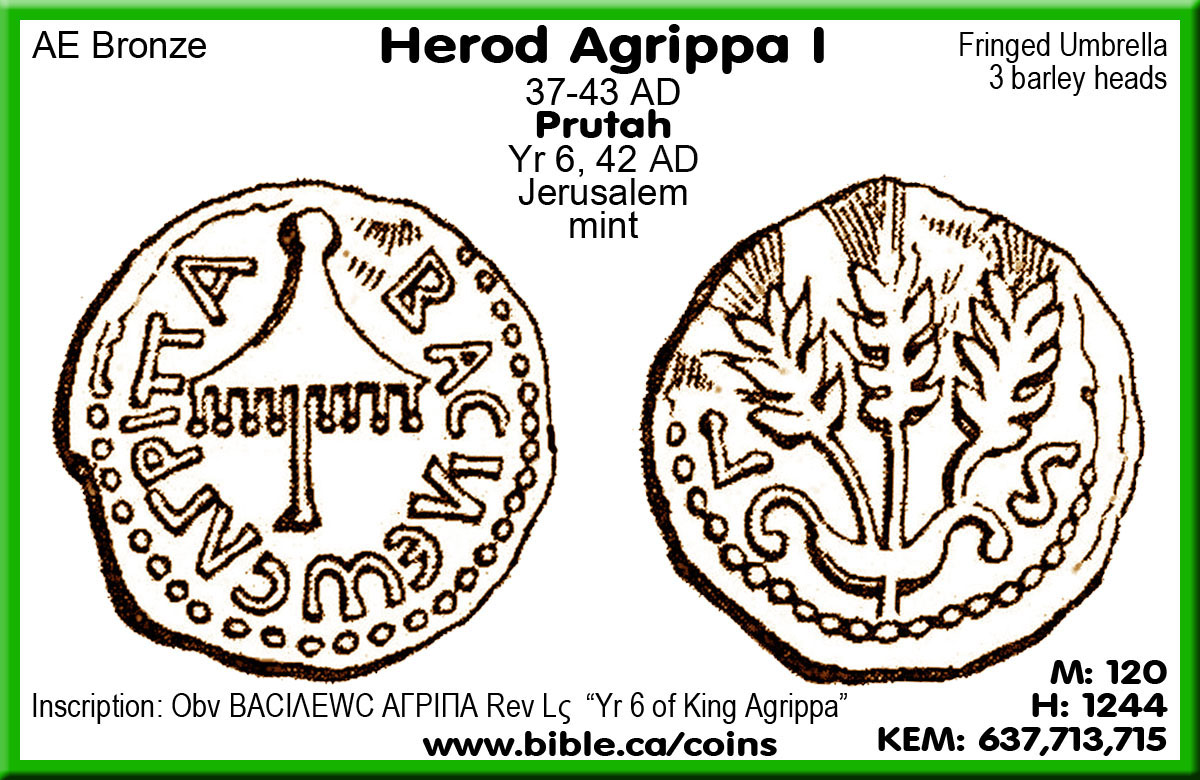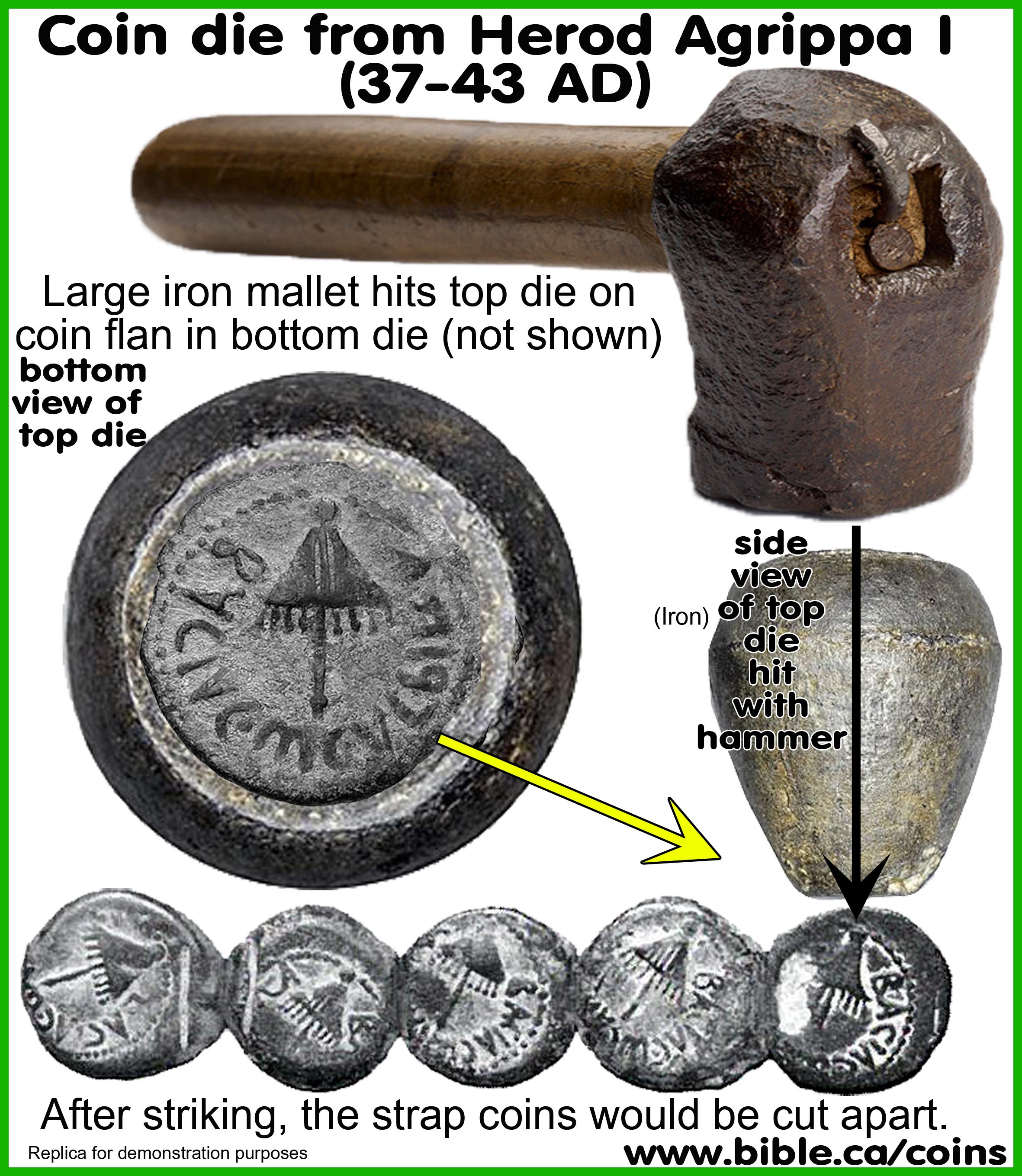The Assassination of Gedaliah
1st governor of Judea: 3 months: 9 Tammuz-Tishri (July - September) 587 BC
Governors of Judah: 587 BC- 66 AD
"The rebellion to restore the throne of David on earth."
Bulla of Gedaliah who is over the house
(Jeremiah chapters 39-44)
Bible Bullae from Israel and Judah
|
Gedaliah 1st Governor of Judea in 587 BC "Archaeologists are digging up bible stories!!!" 1. Glyptic artifact: Clay Bulla 2. Inscription: "Belonging to Gedaliah who is over the house" 3. Provenance: Lachish official archeological dig 1935 AD season 4. Current location: Israel Museum 5. Date: 587 BC 6. Bible verses: Jer 39-44: 2 Kings 25:22; Jeremiah 40:13–41:4 7. Events: Gedaliah, 1st Judean governor appointed by Nebuchadnezzar in 587 BC, assassinated by Ishmael and Baalis. |
"So they came to Gedaliah at Mizpah along with Ishmael the son of Nethaniah, and the sons of Ephai the Netophathite and Jaazaniah the son of the Maacathite. Johanan the son of Kareah said, 'Are you well aware that Baalis the king of Ammon has sent Ishmael to take your life? But Gedaliah did not believe them. Ishmael the son of Nethaniah, the son of Elishama, of the royal family and one of the chief officers [Jaazaniah] of the king came Gedaliah at Mizpah and Ishmael with ten men arose and killed Gedaliah." (summary of Jeremiah 40:8-41:2)
|
|
|||||
|
The assassination of Gedaliah, 1st governor of Judah 587 BC 2 Kings 25:22; Jeremiah 40:13–41:4 |
|||||
|
The reading of the text matches the archeology in the ground |
|||||
|
|
||||||
|
Encyclopedia of Bullae and Seals: The Exhibit: On-line Museum of Bulla and seals Security: How bullae are made to seal papyrus Forgeries: Known fake bullae and seals |
||||||
|
|
||||||
|
Archaeologists are digging up bible stories!!! |
||||||
|
Archaeology is an important science that confirms the historical accuracy of the Bible. Since the Bible refers to hundreds of cities, kings, and places, we would expect to find evidence from on-site excavations. And this is exactly what we have found. The Bible is the most historically accurate book of history on earth. Read the Bible daily! |
|
|||||
|
|
||||||
Encyclopedia of Bullae and Seals of Judea and Israel
|
Bulla "belonging to Gedaliah who is over the house" 1. Glyptic artifact: Clay Bulla 2. Inscription: "Belonging to Gedaliah who is over the house" 3. Provenance: Lachish official archeological dig 1935 AD season 4. Current location: Israel Museum 5. Date: 587 BC 6. Bible verses: 2 Kings 25:22; Jeremiah 40:13–41:4 7. Events: Gedaliah, 1st Judean governor appointed by Nebuchadnezzar in 587 BC, assassinated by Ishmael and Baalis helped by Jaazaniah and Maimen. |
The assassination of Gedaliah, 1st Governor of Judea in 587 BC
Don't call God a Liar!
CAST OF CHARACTERS
|
Jeremiah Prophet |
Jeremiah was born around the same year as Josiah in 648 BC. He started preaching at age 19 when Josiah began purging the idols from the land. He wrote the books of Kings and Jeremiah. His ministry lasted until 561 BC when he recorded the rations given to Coniah by the new King of Babylon Evil-merodach. The chronology of the book of Jeremiah is confusing and needs the index we supplied on the "timeline of Jeremiah" chart above in the little call out box. |
|
Gedaliah Governor of Judah |
A member of an important scribal family and the first governor of Judea appointed by Nebuchadnezzar for 3 months in 587 BC: 9 Tammuz-Tishri (July - September) until he was assassinated by Ishmael, the son of David in cooperation with Baalis king of Ammon. |
|
Nebuchadnezzar King of Babylon (605-562 BC) |
King of Babylon whom God called, "My servant" who burned Jerusalem and deported the Jews to Babylon for 70 years. |
|
Nebuzaradan Army general |
Nebuchadnezzar's army commander for the entire operation to burn Jerusalem and destroy the temple. |
|
Ishmael king's son |
Wanted to replace Gedaliah as king. Distant grandson of David and Bathsheba who fled to Baalis king of Ammon, then returned to murder Gedaliah and claim the throne for himself after delivering slaves to Baalis in exchange for his support |
|
Baalis king of Ammon |
King of Ammon with capital city at Rabbah (Modern Ammon, Jordan) was the master mind behind the murder of Gedaliah who offered to support Ishmael as the new king of Judah in exchange for Jewish slaves. |
|
Johanan Zedekiah's failed army commander |
Army commander who jumped the sinking ship like rats and hid like chickens in the fields of Judah until the Babylonians returned to Babylon. He then came out like a man of steel first offering to kill Ishmael for Gedaliah then defeating Ishmael after he had kidnapped the people for the King of Ammon. Johanan then revealed his blackened heart in disobeying Jeremiah twice:
|
|
Repatriated Refugees |
This group of faithless idol worshippers also disobeyed Jeremiah like Johanan by fleeing to Ammon, Moab and Edom instead of surrendering. They also move to Egypt. |
|
Wicked remnant in Judah |
Those the Babylonians did not deport. These are the idol worshippers who did not surrender but were useless to the Babylonians because they were old, lame, unemployable, very poor etc. It is a huge mistake to think they were left behind because God desired them to be there. They just got lucky. But they revealed their wicked hearts in first moving to Egypt and then openly telling Jeremiah he was a liar and they were not going to stop worshipping idols |
|
Faithful Remnant in Babylon |
These are the cream of the spiritual crop, the first fruits of the age, the faithful worshippers of YHWH who believed the message of the Bible and the prophets to surrender to the Babylonians. They surrendered early in 605 BC along with Daniel, Shadrach, Meshach, Abed-nego. It took great faith to give up all your earthly belongings and your life as you know it and to walk away from it all with the cloths on your back to start a new life from scratch in Babylon for 70 years. |
|
Hophra King of Egypt 589-570 BC |
This is the king of Egypt to promised military help to Zedekiah but retreated. Zedekiah has relied on him instead of God to repel Babylonians. When the Jews migrated against the wishes of Jeremiah to Egypt, they were under the control of Hophra. In 582 Nebuchadnezzar defeats Hophra and kills the pagan Jews living in Egypt. Hophra rebelled against Babylon in 571 because of the 6-18 months (~573-571 BC) of insanity of Nebuchadnezzar in Daniel 4. In 570 BC Nebuchadnezzar kills Hophra fulfilling the prophecy of Jeremiah. |
Don't call God a Liar!
Introduction: The assassination of Gedaliah
- The story of the assassination of Gedaliah is the final act of rebellion by faithless, self-seeking, worldly ambitious, pagan, idol worshipping and disobedient Jews.
- God had willed that the throne of David had become forever extinct on earth and having Gedaliah, a mere scribe as king, was quite a shock to Ishmael, a direct descendant of David and Bathsheba and living heir to the throne… or so he though.
- This shock, indignation, lack of faith and personal ambition led Ishmael, "the king's son" to rise up and kill Gedaliah, the Lord's anointed.
- Jeremiah had instructed the faithful Jews to surrender to Nebuchadnezzar in each of his three attacks on Jerusalem (605, 597, 587 BC).
- Those who left were the "cream of the spiritual crop" and became the pure remnant of Israel who returned to Judea until the coming of Christ.
- Those who disobeyed Jeremiah's call to surrender to Nebuchadnezzar by staying in Jerusalem, hiding in the fields or seeking refuge in Ammon, Moab or Edom were killed.
- Archeology has uncovered six different bulla and seals of men involved in the assassination of Gedaliah! This is an excellent example of how archeology verifies in the ground what we read in the book.
- We have found six seals and Bullae of 6 different men involved in the story of the assassination of Gedaliah from a single Bible text.
- "So they came to Gedaliah at Mizpah along with Ishmael the son of Nethaniah, and the sons of Ephai the Netophathite and Jaazaniah the son of the Maacathite. Johanan the son of Kareah said, 'Are you well aware that Baalis the king of Ammon has sent Ishmael to take your life? But Gedaliah did not believe them. Ishmael the son of Nethaniah, the son of Elishama, of the royal family and one of the chief officers [Jaazaniah] of the king came Gedaliah at Mizpah and Ishmael with ten men arose and killed Gedaliah." (summary of Jeremiah 40:8-41:2)
- Nebuchadnezzar appointed Gedaliah the first governor of Judah after Zedekiah was deported to Babylon.
- When Nebuchadnezzar deported Zedekiah in 587 BC he appointed this Gedaliah to be governor of Judah.
- Gedaliah governed only 3 months in 587 BC: 9 Tammuz-Tishri (July - September) "But it came about in the seventh month (Tishri), that Ishmael the son of Nethaniah, the son of Elishama, of the royal family, came with ten men and struck Gedaliah down so that he died along with the Jews and the Chaldeans who were with him at Mizpah." (2 Kings 25:25)
- Baalas is a king of Ammon that succeeded in assassinating Gedaliah. Baalas is unknown from any outside written sources but is mentioned by name in one Bible verse: "Now Johanan the son of Kareah and all the commanders of the forces that were in the field came to Gedaliah at Mizpah and said to him, “Are you well aware that Baalis the king of the sons of Ammon has sent Ishmael the son of Nethaniah to take your life?” But Gedaliah the son of Ahikam did not believe them." (Jeremiah 40:13-14)
- "Now as for the people who were left in the land of Judah, whom Nebuchadnezzar king of Babylon had left, he appointed Gedaliah the son of Ahikam, the son of Shaphan over them. When all the captains of the forces, they and their men, heard that the king of Babylon had appointed Gedaliah governor, they came to Gedaliah to Mizpah, namely, Ishmael the son of Nethaniah, and Johanan the son of Kareah, and Seraiah the son of Tanhumeth the Netophathite, and Jaazaniah the son of the Maacathite, they and their men. Gedaliah swore to them and their men and said to them, “Do not be afraid of the servants of the Chaldeans; live in the land and serve the king of Babylon, and it will be well with you.” But it came about in the seventh month, that Ishmael the son of Nethaniah, the son of Elishama, of the royal family, came with ten men and struck Gedaliah down so that he died along with the Jews and the Chaldeans who were with him at Mizpah. Then all the people, both small and great, and the captains of the forces arose and went to Egypt; for they were afraid of the Chaldeans." (2 Kings 25:22–26)
- For example Elnathan is the third "Persian" governor of Judah.
- Gedaliah was a member of the Shephan scribal family.
- Gedaliah was the son of Ahikam, (who was an important advisor to King Josiah: 2 Kgs 22:12, 14; 2 Chr 34:20) and the grandson of Shaphan.
- Gedaliah's father (Ahikam) and grandfather (Shaphan) were directly involved in the story of the lost book of the Law found under Josiah in 623 BC. It was Shaphan (a scribe) who first read the law and reported its contents.
- Baalis king of Ammon hired Ishmael from the royal family of David to assassinate Gedaliah.
- Gedaliah's death was commemorated as the
“fast of Gedaliah,” on the seventh month (Zech 7:5; 8:19) but today the
third day of Tishri (September).

- To this day, the Jews celebrate a fast in honor of the murder of Gedaliah on the third of Tishri, even though it was originally in the seventh month (Zechariah 7:3; 8:19).
I. Nebuchadnezzar's four deportations of Jews to Babylon: 605, 597,587, 582 BC
- 605-587 BC: Jeremiah's message was: Surrender to the Babylonians and live, stay in Judah and die:
- "Thus says the Lord, “Behold, I set before you the way of life and the way of death. “He who dwells in this city will die by the sword and by famine and by pestilence; but he who goes out and falls away to the Chaldeans who are besieging you will live, and he will have his own life as booty. “For I have set My face against this city for harm and not for good,” declares the Lord. “It will be given into the hand of the king of Babylon and he will burn it with fire.” ’" (Jeremiah 21:8–10)
- "“Thus says the Lord, ‘He who stays in this city will die by the sword and by famine and by pestilence, but he who goes out to the Chaldeans will live and have his own life as booty and stay alive.’" (Jeremiah 38:2)
- 605 BC deportation: Small "cream of the crop" remnant of high faith: the first fruits.
- Daniel surrenders to the Babylonians in keeping with the instructions of Jeremiah while Ismael had fled to Ammon to seek refuge from Baalis, king of Ammon and the army had hid in the hills, fields and caves.
- "In the third year (605 BC) of the reign of Jehoiakim king of Judah, Nebuchadnezzar king of Babylon came to Jerusalem and besieged it." (Daniel 1:1)
- The numbers are not given, but it would be a small number that included Daniel, Shadrach, Meshach, Abed-nego.
- It took a huge amount of faith to leave Jerusalem and surrender at the first appearance of Nebuchadnezzar in 605 BC.
- "Since the first Palestinian invasion of Nebuchadnezzar took place in 605 b.c., and resulted in the deportation of a considerable number of hostages (including Daniel, Shadrach, Meshach, and Abednego), this date might serve as the terminus a quo; thus 536 would be approximately seventy years later" (A survey of Old Testament introduction, G. Archer, p403, 1994 AD)
- 601 BC Jehoiakim rebels after Nebuchadnezzar is repelled by the king of Egypt.
- In 609 BC Jehoiakim was initially appointed by Neco II, king of Egypt but when Nebuchadnezzar defeated Neco II in the battle of Carchemish in 605 BC, Jehoiakim was forced to submit to Babylon.
- In 601 BC, Nebuchadnezzar launches an attack on Egypt which failed and had to retreat.
- This military failure Nebuchadnezzar emboldened Jehoiakim to rebel against Babylon with the expectation of assistance of some kind from Egypt. Egypt never did help Jehoiakim and he was led away in chains to Babylon where he died.
- "Late in his fourth year (601/600 b.c.) he marched against the borders of Egypt but was met with a serious setback and consequently spent his fifth year recuperating and refitting his army. In 599/598 b.c., in the ninth month (Kislev), he again moved west and plundered several Arab towns to the east of Palestine. The following year he attacked Palestine, again in the ninth month. The account offers very specific details of his capture of Jerusalem on the second day of Adar (the twelfth month), i.e., February 16, 597 b.c." (WBC, 2 Kings 24:1-20, p348, 1998 AD).
- "Despite his initial successes, Nebuchadnezzar suffered a major setback in the winter of 601/600, when he set out to attack Egypt proper. The site of the battle is not recorded in any source, but its outcome is certain. Nebuchadnezzar was forced to withdraw all the way to Babylonia. In the following year, he did not campaign; he stayed at home refitting “his numerous horses and chariots.”5 Under these circumstances, Jehoiakim saw a chance to free himself from Babylonian vassalage and so rebelled. Nebuchadnezzar’s response was to attack with garrison troops stationed in the West." (AYBC, 2 Kings 24:1, p308, 2008 AD)
- 597 BC Deportation: 10,000 Jews.
- When Jehoiakim was captured, put in chains and deported to Babylon, his son 8 year old Jehoiachin became king. Such a young king was unacceptable to Nebuchadnezzar so he ordered him to surrender.
- Jehoiachin is the only king during the life of Jeremiah who actually did what the prophet said: Submit and Surrender.
- This was a major deportation designed to weaken the Jewish state. All the men of war, the tradesmen, the leaders and army commanders etc.
- Clearly at this time some of them fled to Ammon and hid in the fields and hills.
- "Jehoiachin the king of Judah went out to the king of Babylon, he and his mother and his servants and his captains and his officials. So the king of Babylon took him captive in the eighth year of his reign. He carried out from there all the treasures of the house of the Lord, and the treasures of the king’s house, and cut in pieces all the vessels of gold which Solomon king of Israel had made in the temple of the Lord, just as the Lord had said. Then he led away into exile all Jerusalem and all the captains and all the mighty men of valor, ten thousand captives, and all the craftsmen and the smiths. None remained except the poorest people of the land. So he led Jehoiachin away into exile to Babylon; also the king’s mother and the king’s wives and his officials and the leading men of the land, he led away into exile from Jerusalem to Babylon. All the men of valor, seven thousand, and the craftsmen and the smiths, one thousand, all strong and fit for war, and these the king of Babylon brought into exile to Babylon." (2 Kings 24:12–16)
- "These are the people whom Nebuchadnezzar carried away into exile: in the seventh year 3,023 Jews;" (Jeremiah 52:28)
- 587 BC Deportation and destruction of the temple of Solomon: only 832 people.
- "in the eighteenth year of Nebuchadnezzar 832 persons from Jerusalem;" (Jeremiah 52:29)
- What is stunning about this tiny number is the fact that the entire city was destroyed.
- The 832 must have surrendered immediately but for the 300,000 living in the city it was death!
- God's grace had come to an end. Repeated warnings to repent or surrender had been ignored.
- When God's wrath destroyed His holy temple, the people paid with their lives and blood.
- 582 BC Deportation in retaliation to the killing of Gedaliah and destruction of the Jews who fled to Egypt:
- "in the twenty-third year of Nebuchadnezzar, Nebuzaradan the captain of the guard carried into exile 745 Jewish people; there were 4,600 persons in all." (Jeremiah 52:30)
- "The third deportation in the twenty-third year of King Nebuchadrezzar, i.e., 582/1 b.c., is not so easy to identify, but it may have been associated with a further revolt, or have been a belated punitive raid for the assassination of Gedaliah." (NICOT, Jer 52:30, p782, 1980 AD)
- "The exile of 582 persons likely refers to the almost certain Babylonian retaliation for the assassination of Gedaliah and the massacre of the Babylonian garrison." (UNCS, Jer 52:30, p323, 2008 AD)
- "(180) And when they were there, God signified to the prophet that the king of Babylon was about making an expedition against the Egyptians, and commanded him to foretell to the people that Egypt should be taken, and the king of Babylon should slay some of them, and should take others captive, and bring them to Babylon; (181) which things came to pass accordingly; for on the fifth year after the destruction of Jerusalem, which was the twenty-third of the reign of Nebuchadnezzar, he made an expedition against Celesyria; and when he had possessed himself of it, he made war against the Ammonites and Moabites; (182) and when he had brought all those nations under subjection, he fell upon Egypt, in order to overthrow it; and he slew the king that then reigned, and set up another; and he took those Jews that were there captives, and led them away to Babylon; (183) and such was the end of the nation of the Hebrews, as it hath been delivered down to us, it having twice gone beyond Euphrates; for the people of the ten tribes were carried out of Samaria by the Assyrians in the days of king Hoshea; after which the people of the two tribes that remained after Jerusalem was taken [were carried away] by Nebuchadnezzar, the king of Babylon and Chaldea. (184) Now as to Shalmanezer, he removed the Israelites out of their country, and placed therein the nation of the Cutheans, who had formerly belonged to the inner parts of Persia and Media, but were then called Samaritans, by taking the name of the country to which they were removed: but the king of Babylon, who brought out the two tribes, placed no other nation in their country, by which means all Judea and Jerusalem, and the temple, continued to be a desert for seventy years; (185) but the entire interval of time which passed from the captivity of the Israelites, to the carrying away of the two tribes proved to be a hundred and thirty years, six months, and ten days. (Josephus Antiquities 10.180-185)
II. The Bible story of the assassination of Gedaliah, 1st governor of Judea:
- Gedaliah was the first Judean governor who ruled for 3 months in 587 BC: Tammuz-Tishri (July - September)
- Judah had governors appointed under the occupation of Babylon, Persia, Greece and Rome right down to the destruction of Jerusalem in 70 AD.
- Their sin and disobedience and idolatry caused them to lose all their autonomy.
- In the same way we become slaves to the devil when we sin.
- Here is a map of all the placed in the
story of the assassination of Gedaliah:
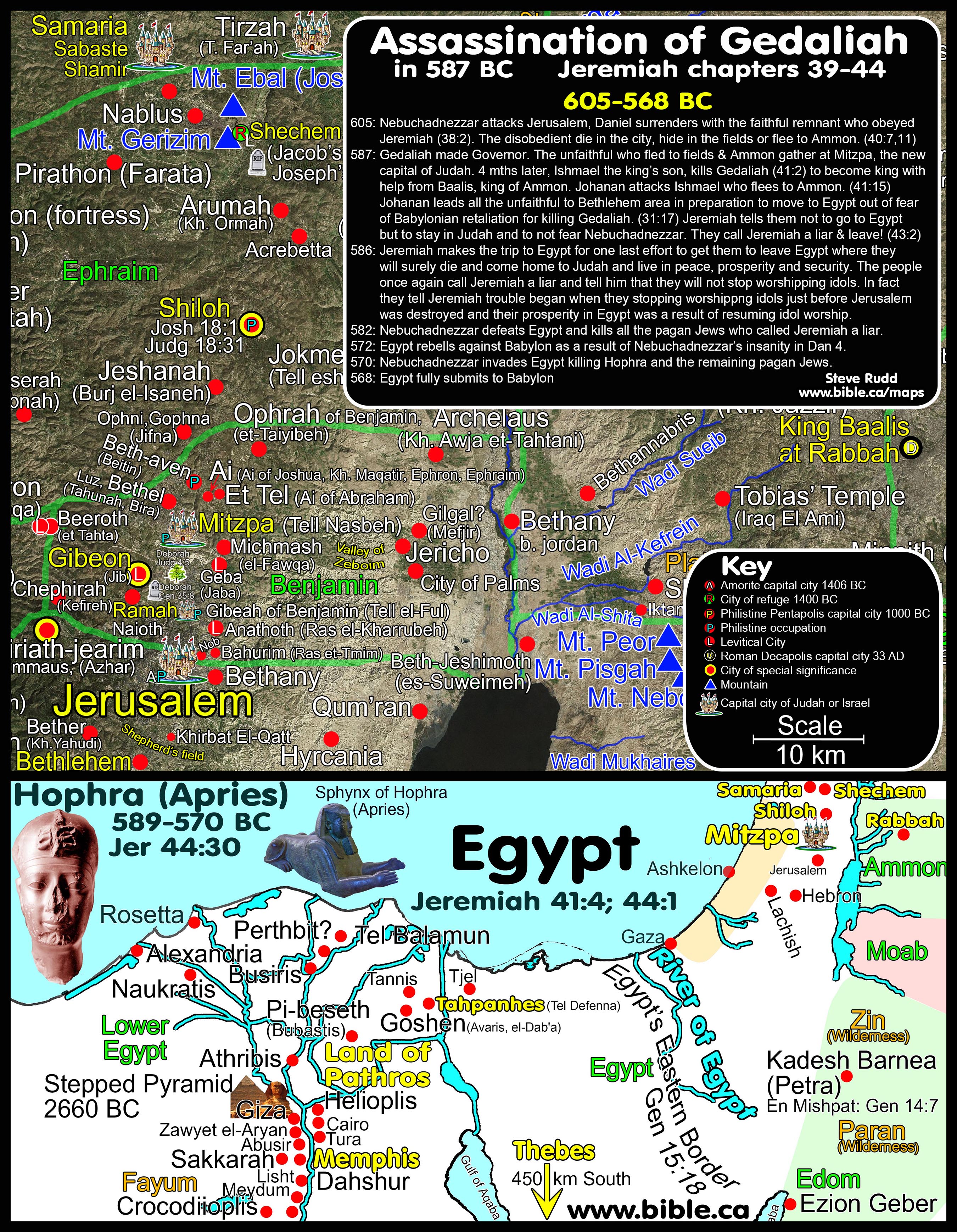
- Gedaliah commanded the people to submit to the Babylonians without any fear, settle down in Judah and carry on their normal lives.
- "Now as for the people who were left in the land of Judah, whom Nebuchadnezzar king of Babylon had left, he appointed Gedaliah the son of Ahikam, the son of Shaphan over them. When all the captains of the forces, they and their men, heard that the king of Babylon had appointed Gedaliah governor, they came to Gedaliah to Mizpah, namely, Ishmael the son of Nethaniah, and Johanan the son of Kareah, and Seraiah the son of Tanhumeth the Netophathite, and Jaazaniah the son of the Maacathite, they and their men. Gedaliah swore to them and their men and said to them, “Do not be afraid of the servants of the Chaldeans; live in the land and serve the king of Babylon, and it will be well with you.” But it came about in the seventh month, that Ishmael the son of Nethaniah, the son of Elishama, of the royal family, came with ten men and struck Gedaliah down so that he died along with the Jews and the Chaldeans who were with him at Mizpah. Then all the people, both small and great, and the captains of the forces arose and went to Egypt; for they were afraid of the Chaldeans." (2 Kings 25:22-26)
- "2. (159) When Nebuzaradan had done thus, he made haste to Babylon; but as to those that fled away during the siege of Jerusalem, and had been scattered over the country, when they heard that the Babylonians were gone away, and had left a remnant in the land of Jerusalem, and those such as were to cultivate the same, they came together from all parts to Gedaliah to Mispah. (160) Now the rulers that were over them were Johanan, the son of Kareah, and Jezaniah, and Seraiah, and others beside them. Now there was of the royal family one Ishmael, a wicked man, and very crafty, who during the siege of Jerusalem, fled to Baalis, king of the Ammonites, and abode with him during that time; (161) and Gedaliah persuaded them, now they were there, to stay with him, and to have no fear of the Babylonians, for that if they would cultivate the country, they should suffer no harm." (Josephus Antiquities 10.158–161)
- Josephus on Gedaliah's character as a gentle and righteous man:
- "1. (155) Now the general of the army, Nebuzaradan, when he had carried the people of the Jews into captivity, left the poor, and those that had deserted, in the country; and made one, whose name was Gedaliah, the son of Ahikam, a person of a noble family, their governor; which Gedaliah was of a gentle and righteous disposition. (156) He also commanded them that they should cultivate the ground, and pay an appointed tribute to the king. He also took Jeremiah the prophet out of prison, and would have persuaded him to go along with him to Babylon, for that he had been enjoined by the king to supply him with whatsoever he wanted; and if he did not like to do so, he desired him to inform him where he resolved to dwell, that he might signify the same to the king." (Josephus Antiquities 10.154–156)
- The deal between Baalis king of Ammon and Ishmael the son of David was one of mutual enrichment, power and prestige:
- THE DEAL: If Ishmael delivers Baalis Jewish slaves then Baalis will support Ishmael's bid to be king!
- Remember that a large group of Jews had been living in the kingdom of Ammon (Rabbah, modern Ammon, Jordan) for up to 18 years and they were probably very useful and productive members of society, as we see Jews today are very productive in all areas of life!
- This productive and resourceful group left Ammon and returned home to Jerusalem WITH Ishmael.
- We know, therefore that the deal between Baalis and Ishmael had been made before these Jews began their journey from Ammon to be repatriated with Judah across the Jordan River. Jerusalem is only 75 km from Ammon. A one or two day journey.
- "(164) And when Johanan, and the rulers that were with him, observed the country, and the humanity of Gedaliah, they were exceedingly in love with him, and told him that Baalis, the king of the Ammonites, had sent Ishmael to kill him by treachery, and secretly, that he might have the dominion over the Israelites, as being of the royal family" (Josephus Antiquities 10.164)
- Meanwhile, another group of Jews had disobeyed Jeremiah's order to surrender to the Babylonians who had hid in caves in the hills and fields, came out of their hiding places and joined Gedaliah at Mitzpa.
- Johanan the son of Kareah was the commander of the Jewish army at the time of Zedekiah's deportation. He and a battalion of soldiers had successfully escaped capture or detection by the Babylonians.
- This second group of faithless disobedient Jews had their eye on gaining power in the vacuum left by the departing Babylonian army.
- While it was Johanan the son of Kareah, who warned Gedaliah about the assignation plot, as we will see later, he was an evil man who led a large group to their destruction in Egypt after Jeremiah specifically forbad them under the command of God himself.
- 587 BC, 7th month: Ishmael and ten men kill Gedaliah who had governed for only 3 months.
- After Ishmael had killed Gedaliah, he rounded up all the people he could and prepared to deport them back to the king of Ammon likely to be sold a slaves… until they were stopped by the commander of the Jewish army arrived.
- "Then Ishmael took captive all the remnant of the people who were in Mizpah, the king’s daughters and all the people who were left in Mizpah, whom Nebuzaradan the captain of the bodyguard had put under the charge of Gedaliah the son of Ahikam; thus Ishmael the son of Nethaniah took them captive and proceeded to cross over to the sons of Ammon." (Jeremiah 41:10)
- Notice again that Ishmael was bringing back anybody he could "kidnap", including those whom Nebuchadnezzar had left under Gedaliah's control.
- Thus the deal was for Ishmael to deliver a large slave population to Ammon and in return Baalis would support Ishmael's bid to become king of Judah.
- The slaves would include those who had returned from Ammon with Ishmael (and act of betrayal) and those who had stayed in Judah and never left.
- 587 BC, fall: The great escape: Ishmael flees back to Ammon and Jonanan flees to Egypt after rescuing the people from Ishmael out of fear of Babylonian retaliation.
- "But Johanan the son of Kareah and all the commanders of the forces that were with him heard of all the evil that Ishmael the son of Nethaniah had done. So they took all the men and went to fight with Ishmael the son of Nethaniah and they found him by the great pool that is in Gibeon." (Jeremiah 41:11–12)
- "But Ishmael the son of Nethaniah escaped from Johanan with eight men and went to the sons of Ammon." (Jeremiah 41:15)
- "And they went and stayed in Geruth Chimham, which is beside Bethlehem, in order to proceed into Egypt because of the Chaldeans; for they were afraid of them, since Ishmael the son of Nethaniah had struck down Gedaliah the son of Ahikam, whom the king of Babylon had appointed over the land." (Jeremiah 41:17–18)
- Johanan, army general, asks Jeremiah to seek advice from God and after 10 days God answers: DO NOT GO TO EGYPT.
- Johanan calls Jeremiah a liar! (Jer 43:2)
- Johanan, had already disobeyed Jeremiah once when they hid from the Babylonians instead of surrendering to them. Now Johanan will disobey Jeremiah a second time when he is commanded to stay in Judah without fear of the Babylonians and not flee to Egypt.
- "But as soon as Jeremiah, whom the LORD their God had sent, had finished telling all the people all the words of the LORD their God—that is, all these words— Azariah the son of Hoshaiah, and Johanan the son of Kareah, and all the arrogant men said to Jeremiah, “You are telling a lie! The LORD our God has not sent you to say, ‘You are not to enter Egypt to reside there’; but Baruch the son of Neriah is inciting you against us to give us over into the hand of the Chaldeans, so they will put us to death or exile us to Babylon.” So Johanan the son of Kareah and all the commanders of the forces, and all the people, did not obey the voice of the LORD to stay in the land of Judah. But Johanan the son of Kareah and all the commanders of the forces took the entire remnant of Judah who had returned from all the nations to which they had been driven away, in order to reside in the land of Judah— the men, the women, the children, the king’s daughters and every person that Nebuzaradan the captain of the bodyguard had left with Gedaliah the son of Ahikam and grandson of Shaphan, together with Jeremiah the prophet and Baruch the son of Neriah— and they entered the land of Egypt (for they did not obey the voice of the LORD) and went in as far as Tahpanhes." (Jeremiah 43:1–7)
- 587 BC Winter: Jeremiah and the entire group of
unfaithful Jews who disobeyed Jeremiah's command to surrender when
Nebuchadnezzar attacked, including those who where left behind because
they were old, sick, lame, destitute or otherwise no use to the
Babylonians, AND General Johanan and his army troops who had hid in the
fields, left Judah and moved to Tahpanhes in Egypt (see map)
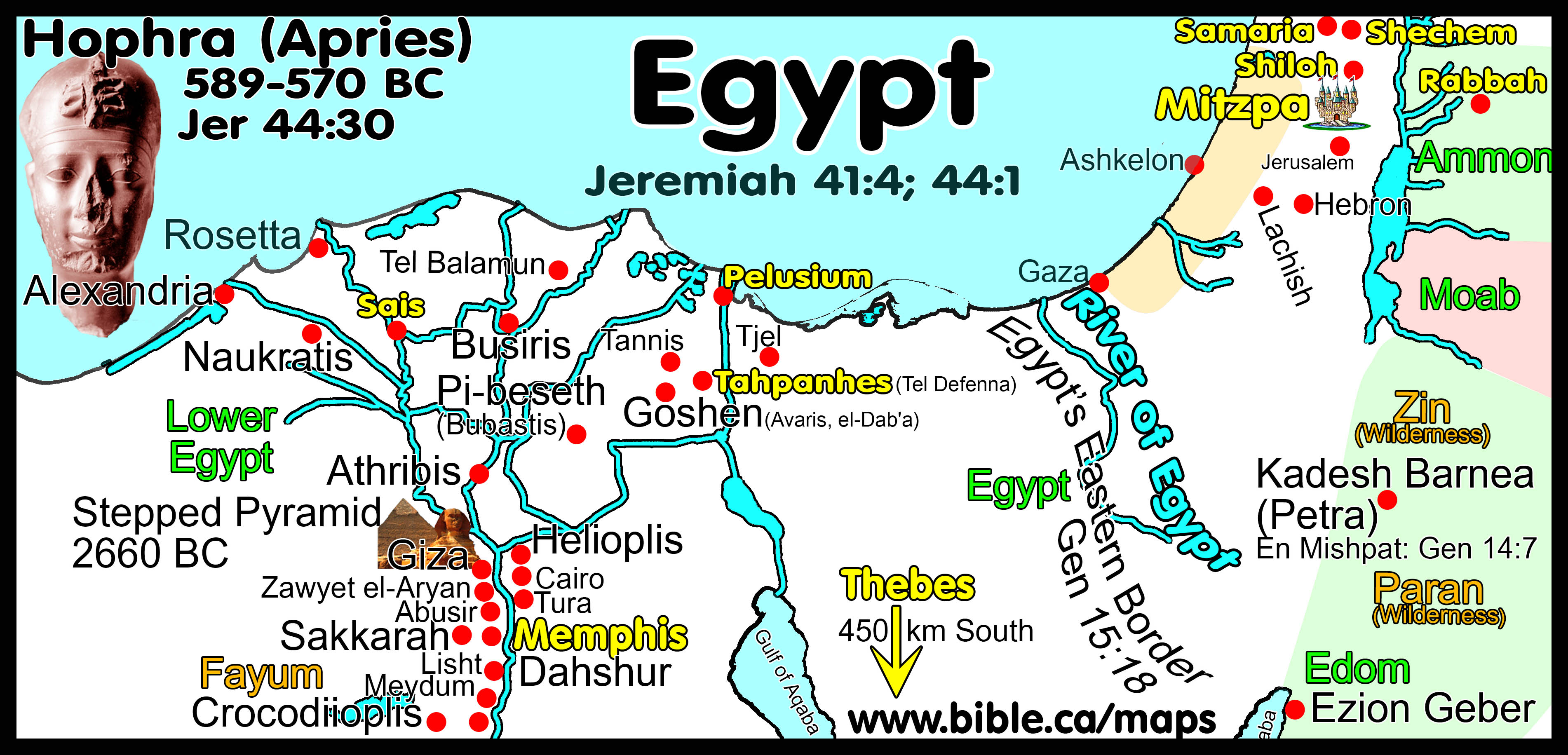
- Winter 587 BC: Jeremiah moves to Egypt with all the Jews. He warn the Jews living there of their impending destruction. Jeremiah predicts destruction in Egypt and in one of the most stunning and brazen confessions in the entire Jews say to Jeremiah:
- Those who replied included Johanan, the very army commanded who first warned Gedaliah about the threat to his life, then defeated Ishmael and recaptured the hostages, then lead the entire group to Bethlehem as a staging ground to make the migration to Egypt.
- "“As for the message that you have spoken to us in the name of the Lord, we are not going to listen to you! “But rather we will certainly carry out every word that has proceeded from our mouths, by burning sacrifices to the queen of heaven and pouring out drink offerings to her, just as we ourselves, our forefathers, our kings and our princes did in the cities of Judah and in the streets of Jerusalem; for then we had plenty of food and were well off and saw no misfortune. “But since we stopped burning sacrifices to the queen of heaven and pouring out drink offerings to her, we have lacked everything and have met our end by the sword and by famine.” “And,” said the women, “when we were burning sacrifices to the queen of heaven and were pouring out drink offerings to her, was it without our husbands that we made for her sacrificial cakes in her image and poured out drink offerings to her?”" (Jeremiah 44:16–19)
- In 582 BC, 5 years after Jerusalem was burned, God sends Nebuchadnezzar "His servant" to kill the pagan Jews who fled to Egypt against Jeremiah's orders:
- "(180) And when they were there, God signified to the prophet that the king of Babylon was about making an expedition against the Egyptians, and commanded him to foretell to the people that Egypt should be taken, and the king of Babylon should slay some of them, and should take others captive, and bring them to Babylon; (181) which things came to pass accordingly; for on the fifth year after the destruction of Jerusalem, which was the twenty-third of the reign of Nebuchadnezzar, he made an expedition against Celesyria; and when he had possessed himself of it, he made war against the Ammonites and Moabites; (182) and when he had brought all those nations under subjection, he fell upon Egypt, in order to overthrow it; and he slew the king that then reigned, and set up another; and he took those Jews that were there captives, and led them away to Babylon; (183) and such was the end of the nation of the Hebrews, as it hath been delivered down to us, it having twice gone beyond Euphrates; for the people of the ten tribes were carried out of Samaria by the Assyrians in the days of king Hoshea; after which the people of the two tribes that remained after Jerusalem was taken [were carried away] by Nebuchadnezzar, the king of Babylon and Chaldea." (Josephus Antiquities 10.179-183)
- "Until a few decades ago, considerable skepticism was voiced by many critics as to the fulfillment of the prediction made by Jeremiah in 43:9–13 and 44:30 that northern Egypt would be devastated by an invasion of the Chaldeans under Nebuchadnezzar (cf. also Ezek. 29:19–20, which contains a similar prediction). The pagan Greek historians make no mention of such an invasion, although there is a definite record to be found in Josephus’s Antiquities 10.9.5–7: “Johanan took those whom he had rescued and came to a certain place called Mandara. On the fifth year (582/81) after the destruction of Jerusalem, which was the twenty-third (582) of the reign of Nebuchadnezzar, he made an expedition against Coele-Syria; and when he had possessed himself of it, he made war against the Ammonites and Moabites; and when he had brought all those nations under subjection, he fell upon Egypt in order to overthrow it, and he slew the king that then reigned and set up another; and he took those Jews that were there captives, and led them away to Babylon; and such was the end of the nation of the Hebrews.” Many authorities tended to discount this testimony of Josephus as merely manufactured in order to support the Hebrew Scriptures. But R. Campbell Thompson of Oxford remarks: “The small fragment of a Babylonian chronicle first published by Pinches shows that Nebuchadnezzar launched an expedition against Egypt in his thirty-seventh year, i.e., about 567 b.c.… the very distance to which he penetrated is a matter of dispute.… We might almost assume from the tradition that certain Babylonian settlers built a ‘Babylon’ in Egypt near the Pyramids, which appears to have existed as an important fort in the time of Augustus, that his army at all events left some mark there.” In ANET3 (p. 308) appears a translation of a fragmentary Babylonian text in the British Museum containing the following sentence: “In the thirty-seventh year (568/67), Nebuchadnezzar, king of Babylon, marched against Mi-sir [Egypt] to deliver a battle.” Additional archaeological confirmation is found in an inscription on the statue of Nes-hor in the Louvre. Nes-hor was a governor of southern Egypt under Hophra (Uaḥ-ib-Ra, in Egyptian). In this biographical record he states that an army of Asiatics and northern peoples who had invaded Egypt attempted to advance up the Nile valley to Ethiopia, but this was fortunately averted by the favor of the gods.” In view of this evidence, therefore, it is hardly justifiable to deny any longer the historicity of Nebuchadnezzar’s invasion of Egypt, or to question that it was a very serious and devastating incursion." (A survey of Old Testament introduction, G. Archer, p404, 1994 AD)
- The faithful, "obedient to the prophet", righteous seed of Judah had surrendered to Nebuchadnezzar for deportation to Babylon who lived safe and contented and prosperous lives.
- The idol worshipping faithless rejected the commands of the prophet, calling him a liar and it ended in their death.
- Those who hid in the Judean fields or fled to Ammon, Moab and Edom instead of "sitting on the 70 year time out bench" in Babylon as God commanded, violated Jeremiah's commands a second time and went to Egypt to die.
- The pure tiny remnant of pure Jewish faith that stayed in Babylon for 70 years, experienced many exciting things:
- Shadrach, Meshach, Abed-nego being thrown into the furnace only to be praised by Nebuchadnezzar in the direct presence of Zedekiah.
- Daniel in the Lion's Den
- The conquest of Darius the Mede
- Cyrus' decree to return to Jerusalem in 538 BC
- The trip home to Judah to rebuild the city walls and the temple under Ezra, Nehemiah.
- The amazing story of Esther in 483 BC.
- The birth, crucifixion and resurrection of Christ!
- The obedience to God leads to life eternal!
III. The extinction of the throne of David on earth: Coniah, Gedaliah
|
Detailed outline on Jesus Christ seated on the throne of David now. |
- 587 BC, third month: God had brought the dynasty of king David to a formal end and in a kind of "replacement theology" scenario where, Gedaliah, son of a scribe was now king and Ishmael, the Royal son of David had been made nothing.
- Ishmael was a descendant of David and Bathsheba and part of the ancient Elishama clan of David's sons.
- Many others had also fled with Ishmael to Ammon to escape the Babylonians. This brought much money and skilled labour to the Ammonite kingdom.
- 18 years later, when the Babylonians returned home they appointed Gedaliah as the first governor of Judea with essentially same power and authority as the previous kings of Judah.
- Ishmael, a genuine royal heir to the throne of David, was unhappy and perhaps indignant that Gedaliah a mere scribe, was sitting on David's throne.
- Jeremiah himself prophesied the extinction of the throne of David on earth regarding King Jehoiachin (Jeconiah, Coniah), Jehoiakim's son, who reigned 3 months in Jerusalem at age 8.
a. Jeremiah 22:24-30 made the important prophecy that no direct, blood descendant of Jeconiah (Coniah) would ever sit and rule on a physical throne in physical Jerusalem ever again. This proves premillennialism wrong in that it brings Christ back to earth to sit on the throne of David in Jerusalem. (Mt 1:12; Hos 13:11; Acts 2:29-36)
b. No descendant of Jeconiah will ever rule in physical Jerusalem ever again: "“As I live,” declares the Lord, “even though Coniah [Jehoiachin] the son of Jehoiakim king of Judah were a signet ring on My right hand, yet I would pull you off; and I will give you over into the hand of those who are seeking your life, yes, into the hand of those whom you dread, even into the hand of Nebuchadnezzar king of Babylon and into the hand of the Chaldeans. “I will hurl you and your mother who bore you into another country where you were not born, and there you will die. “But as for the land to which they desire to return, they will not return to it. “Is this man Coniah a despised, shattered jar? Or is he an undesirable vessel? Why have he and his descendants been hurled out And cast into a land that they had not known? “O land, land, land, Hear the word of the Lord! “Thus says the Lord, ‘Write this man down childless, A man who will not prosper in his days; For no man of his descendants will prosper Sitting on the throne of David Or ruling again in Judah.’ ”" (Jeremiah 22:24–30)
- Jesus is a physical descendant of Jeconiah: "And after the deportation to Babylon: Jechoniah was the father of Salathiel, and Salathiel the father of Zerubbabel," (Matthew 1:12)
- The earthly throne never was God's plan: "I gave you a king in my anger, and I took him away in my wrath." (Hosea 13:11)
- Jesus is sitting on the throne of David in heaven now: "“Fellow Israelites, I may say to you confidently of our ancestor David that he both died and was buried, and his tomb is with us to this day. Since he was a prophet, he knew that God had sworn with an oath to him that he would put one of his descendants on his throne. Foreseeing this, David spoke of the resurrection of the Messiah, saying, ‘He was not abandoned to Hades, nor did his flesh experience corruption.’ This Jesus God raised up, and of that all of us are witnesses. Being therefore exalted at the right hand of God, and having received from the Father the promise of the Holy Spirit, he has poured out this that you both see and hear. For David did not ascend into the heavens, but he himself says, ‘The Lord said to my Lord, “Sit at my right hand, until I make your enemies your footstool.” ’ Therefore let the entire house of Israel know with certainty that God has made him both Lord and Messiah, this Jesus whom you crucified.”" (Acts 2:29-36)
f. Nebuchadnezzar also deported him to Babylon: "Jehoiachin [Coniah] the king of Judah went out to the king of Babylon, he and his mother and his servants and his captains and his officials. So the king of Babylon took him captive in the eighth year of his [Nebuchadnezzar's] reign." (2 Kings 24:12)
g.
Although Josiah had three sons who were kings, Coniah
was the end of the dynasty of King David.
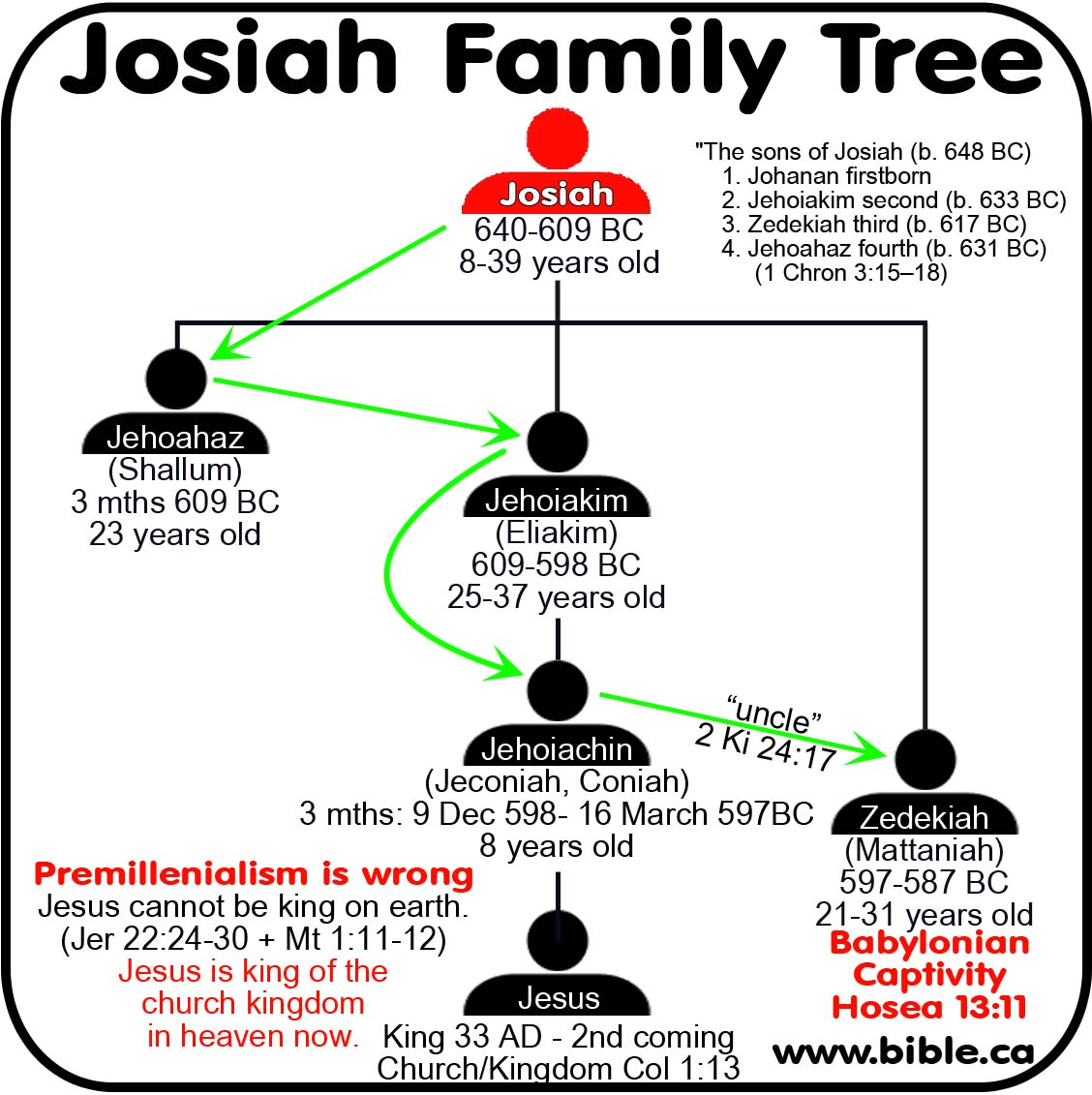
3. Jeremiah offered messianic hope of restoration of Judah and Israel in Christ, in the church:
a. "Then I will give you shepherds [apostles, church elders] after My own heart, who will feed you on knowledge and understanding. “It shall be in those days when you are multiplied and increased in the land,” declares the Lord, “they will no longer say, ‘The ark of the covenant of the Lord.’ And it will not come to mind, nor will they remember it, nor will they miss it, nor will it be made again. “At that time they will call Jerusalem ‘The Throne of the Lord,’ and all the nations will be gathered to it, to Jerusalem, for the name of the Lord; nor will they walk anymore after the stubbornness of their evil heart. “In those days the house of Judah will walk with the house of Israel, and they will come together from the land of the north to the land that I gave your fathers as an inheritance." (Jeremiah 3:15–18)
b. The throne of God was originally in heaven, but during the time of Saul the throne came to earth until the deportation of Jeconiah (Coniah) and Zedekiah.
c. Jesus Christ sits on the throne of David right now as king of the universe which he created by the power of his own divine might.
d. "‘Behold, days are coming,’ declares the Lord, ‘when I will fulfill the good word which I have spoken concerning the house of Israel and the house of Judah. ‘In those days and at that time I will cause a righteous Branch of David to spring forth; and He shall execute justice and righteousness on the earth. ‘In those days Judah will be saved and Jerusalem will dwell in safety; and this is the name by which she will be called: the Lord is our righteousness.’ “For thus says the Lord, ‘David shall never lack a man to sit on the throne of the house of Israel; and the Levitical priests shall never lack a man before Me to offer burnt offerings, to burn grain offerings and to prepare sacrifices continually.’ ” The word of the Lord came to Jeremiah, saying, “Thus says the Lord, ‘If you can break My covenant for the day and My covenant for the night, so that day and night will not be at their appointed time, then My covenant may also be broken with David My servant so that he will not have a son to reign on his throne, and with the Levitical priests, My ministers. ‘As the host of heaven cannot be counted and the sand of the sea cannot be measured, so I will multiply the descendants of David My servant and the Levites who minister to Me.’ ” And the word of the Lord came to Jeremiah, saying, “Have you not observed what this people have spoken, saying, ‘The two families which the Lord chose, He has rejected them’? Thus they despise My people, no longer are they as a nation in their sight. “Thus says the Lord, ‘If My covenant for day and night stand not, and the fixed patterns of heaven and earth I have not established, then I would reject the descendants of Jacob and David My servant, not taking from his descendants rulers over the descendants of Abraham, Isaac and Jacob. But I will restore their fortunes and will have mercy on them.’ ”" (Jeremiah 33:14–26)
4. Only through Jesus Christ, the branch (seed) of David are the fortunes of David and the throne of David restored IN HEAVEN NOW not on the earth.
IV. The "Saul vs. David | Gedaliah vs. Ishmael" reverse allegory
- The Holy Spirit was careful to draw special attention in showing a reverse parallel in the story of Saul unsuccessfully trying to extinct the throne of David in attempting to kill him, and Ishmael the son of David unsuccessfully trying to restore the throne of David in the successful assassination of Gedaliah.
- The fact there are two whole chapters in Jeremiah about Gedaliah is a signal something greater than insurrection and murder of a governor is in play here.
- Indeed, the destruction of Jerusalem and the temple and the appointment of Gedaliah was like God dropped a nuclear bomb on the entire nation of Israel and Judah.
- Within 5 years of 587 BC, the entire promised land lay uninhabited, desolate and destroyed.
- A brand new world order of perpetual occupation by foreign powers had swept over the Jews which they would have to live with until the coming of Christ.
- The blessings of Jerusalem were transferred to Babylon and the curse of pagan Babylon was transferred to Jerusalem:
- BLESSINGS IN BABYLON: "Thus says the Lord of hosts, the God of Israel, to all the exiles whom I have sent into exile from Jerusalem to Babylon, ‘Build houses and live in them; and plant gardens and eat their produce. ‘Take wives and become the fathers of sons and daughters, and take wives for your sons and give your daughters to husbands, that they may bear sons and daughters; and multiply there and do not decrease. ‘Seek the welfare of the city where I have sent you into exile, and pray to the Lord on its behalf; for in its welfare you will have welfare.’" (Jeremiah 29:4–7, 595 BC)
- CURSE IN JERUSALEM: "for thus says the Lord concerning the king [Zedekiah] who sits on the throne of David, and concerning all the people who dwell in this city, your brothers who did not go with you into exile— thus says the Lord of hosts, ‘Behold, I am sending upon them the sword, famine and pestilence, and I will make them like split-open figs that cannot be eaten due to rottenness. ‘I will pursue them with the sword, with famine and with pestilence; and I will make them a terror to all the kingdoms of the earth, to be a curse and a horror and a hissing, and a reproach among all the nations where I have driven them, because they have not listened to My words,’ declares the Lord, ‘which I sent to them again and again by My servants the prophets; but you did not listen,’ declares the Lord." (Jeremiah 29:16–19, 595 BC)
- The capital city was moved from Jerusalem to Mitzpa, given the destruction and burning of Jerusalem.
- The end of a long established dynasty of father to son kings dating back to 1010 BC when David first ruled from Hebron after the death of Saul and the appointment of a mere scribe, Gedaliah.
- Both Saul and Gedaliah were confirmed as kings at Mitzpa.
- Special attention is drawn to the fact that Jehoiakim, Coniah (Jeconiah) and Zedekiah sat "on the throne of David" but that they were going to be exiled to Babylon. God even set up a king of Deut 28 "blessings and curses" in Jer 17:24-27 where they were told "if you obey the throne of David will continue but if you disobey the throne of David will end forever on earth".
- 605 BC Jehoiakim: "‘Therefore thus says the Lord concerning Jehoiakim king of Judah, “He shall have no one to sit on the throne of David, and his dead body shall be cast out to the heat of the day and the frost of the night." (Jeremiah 36:30)
- 597 BC Coniah (Jeconiah, Jehoiachin): “O land, land, land, Hear the word of the Lord! “Thus says the Lord, ‘Write this man [Coniah] down childless, A man who will not prosper in his days; For no man of his descendants will prosper Sitting on the throne of David Or ruling again in Judah.’ ”" (Jeremiah 22:2930)
- 597 BC Zedekiah: Paralleling the blessings and curses Moses at Shechem in Deut 28: "But it will come about, if you listen attentively to Me,” declares the Lord, “to bring no load in through the gates of this city on the sabbath day, but to keep the sabbath day holy by doing no work on it, then there will come in through the gates of this city kings and princes sitting on the throne of David, riding in chariots and on horses, they and their princes, the men of Judah and the inhabitants of Jerusalem, and this city will be inhabited forever. “They will come in from the cities of Judah and from the environs of Jerusalem, from the land of Benjamin, from the lowland, from the hill country and from the Negev, bringing burnt offerings, sacrifices, grain offerings and incense, and bringing sacrifices of thanksgiving to the house of the Lord. “But if you do not listen to Me to keep the sabbath day holy by not carrying a load and coming in through the gates of Jerusalem on the sabbath day, then I will kindle a fire in its gates and it will devour the palaces of Jerusalem and not be quenched.” (Jeremiah 17:24–27)
- 595 BC Zedekiah: "for thus says the Lord concerning the king [Zedekiah] who sits on the throne of David, and concerning all the people who dwell in this city, your brothers who did not go with you into exile" (Jeremiah 29:16)
- Three times a pagan foreign king Nebuchadnezzar was called "God's servant" who destroyed the temple of David/Solomon.
- "behold, I will send and take all the families of the north,’ declares the Lord, ‘and I will send to Nebuchadnezzar king of Babylon, My servant, and will bring them against this land and against its inhabitants and against all these nations round about; and I will utterly destroy them and make them a horror and a hissing, and an everlasting desolation." (Jeremiah 25:9)
- "“Now I have given all these lands into the hand of Nebuchadnezzar king of Babylon, My servant, and I have given him also the wild animals of the field to serve him." (Jeremiah 27:6)
- "and say to them, ‘Thus says the Lord of hosts, the God of Israel, “Behold, I am going to send and get Nebuchadnezzar the king of Babylon, My servant, and I am going to set his throne right over these stones that I have hidden; and he will spread his canopy over them." (Jeremiah 43:10)
- Gedaliah, Nebuchadnezzar and Cyrus were considered God's Anointed kings and "shepherds of His people exactly like David:
- "Thus says the Lord to Cyrus His anointed, Whom I have taken by the right hand, To subdue nations before him And to loose the loins of kings; To open doors before him so that gates will not be shut:" (Isaiah 45:1)
- “It is I who says of Cyrus, ‘He is My shepherd! And he will perform all My desire.’ And he declares of Jerusalem, ‘She will be built,’ And of the temple, ‘Your foundation will be laid.’ ”" (Isaiah 44:28)
- Saul and Ishmael wanted to kill God's anointed, David and Gedaliah who themselves refused to kill God's anointed (Saul and Ishmael the son of David)
- "Then Abishai said to David, “Today God has delivered your enemy into your hand; now therefore, please let me strike him with the spear to the ground with one stroke, and I will not strike him the second time.” But David said to Abishai, “Do not destroy him, for who can stretch out his hand against the Lord’s anointed and be without guilt?”" (1 Samuel 26:8–9)
- Many cities are identical in the two stories:
- Mitzpa: Saul and Gedaliah were proclaimed rulers at Mitzpa: "Thereafter Samuel called the people together to the Lord at Mizpah;" (1 Samuel 10:17) "So they came to Gedaliah at Mizpah." (Jeremiah 40:8)
- Mitzpa was initial capital city of both Saul and Gedaliah:
- Ammon: David and Ishmael were allied with the king of Ammon (Shobi, Baalis). "Now when David had come to Mahanaim, Shobi the son of Nahash from Rabbah of the sons of Ammon, Machir the son of Ammiel from Lo-debar, and Barzillai the Gileadite from Rogelim, brought beds, basins, pottery, wheat, barley, flour, parched grain, beans, lentils, parched seeds, honey, curds, sheep, and cheese of the herd, for David and for the people who were with him, to eat; for they said, “The people are hungry and weary and thirsty in the wilderness.”" (2 Samuel 17:27–29) "Then David said, “I will show kindness to Hanun the son of Nahash, just as his father showed kindness to me.” So David sent some of his servants to console him concerning his father." (2 Samuel 10:2)
- Gibeon: The final battle to defeat the house of Saul was at the pool of Gibeon who then fled across the Jordan River. (2 Sam 2:13-3:1) The final defeat of the house of David happened at Gibeon when Ishmael fled across the Jordan to Ammon.
- Bethlehem: The throne of David started in Bethlehem when Samuel anointed him and ended when Johanan , the army commander camped near Bethlehem to leave for Egypt. Geruth Kimham is the staging place near Bethlehem just before the Jews in 587 BC fled to Egypt. This was the very parcel of land David gave to a man named Kimham (Chimham, identical Hebrew word) as a reward for his loyalty in defeating David's treasonous son Absalom. (2 Samuel 19:37-40)
- Here is a chart that highlights many of the reverse parallels in the two stories of Saul/David and Ishmael/Gedaliah.
|
Parallels of Saul vs. David and Ishmael vs. Gedaliah |
|
|
Saul was proclaimed king at Mitzpa |
Gedaliah was proclaimed governor at Mitzpa |
|
Mitzpa was the first capital city of the new line of Israelite kings that lasted 465 years (1052-587 BC) |
Mitzpa was the first capital city of the new line of Judean governs that lasted 657 years. (587 BC- 70 AD) |
|
Ishmael was a son of David through Bathsheba and heir to the throne but rejected as king. |
Gedaliah the "commoner" was a scribe God chose to be king. |
|
Saul tried three times and failed to Kill David in a failed attempt to extinct the throne of David |
Ishmael succeeded in killing Gedaliah in a failed attempt to restore the throne of David. |
|
Saul tried three times to kill David and failed |
David had three chances to kill Saul and refused |
|
David had three chances to kill Saul but would never kill God's anointed. |
Ishmael killed God's anointed governor Gedaliah. |
|
Gedaliah was unwilling to kill Ishmael the son of David (seed anointed) when he was warned of the assassination plot. |
Saul and Ishmael were ok with the idea of killing "God's anointed". (David and Gedaliah) |
|
God called David "My servant, My anointed, My Shepherd" |
God called Gedaliah, Nebuchadnezzar and Cyrus called "My servant, My anointed, My Shepherd" |
|
Saul and David refused to retaliate when people opposed their kingship (1 Samuel 10:27 and Shimei: 1 Kings 2:8–9) |
Ishmael killed the governor. |
|
One of David's men offered to kill Saul and david refused. |
One of Gedaliah's men offered to kill Ishmael but he refused. |
|
Saul used the opportunity of a celebratory feast to try to kill David |
Ishmael used the opportunity of a celebratory feast to kill Gedaliah |
|
Saul killed 85 tabernacle priests for supporting David in giving him the holy showbread. |
Ishmael killed 70 worshippers on the way to the house of the Lord to sacrifice for supporting Gedaliah who was used as a lure to their death. |
|
Saul lost the war between the "house of Saul" and the "House of David" resulting in the collapse of the house of Saul. |
Ishmael lost the war to restore the House of David" against the "house of Gedaliah" when he fled back to Ammon in defeat. |
|
The final battle to defeat the house of Saul was at the pool of Gibeon who then fled across the Jordan River. (2 Sam 2:13-3:1) |
The final defeat of the house of David happened at Gibeon when Ishmael fled across the Jordan to Ammon. |
|
At the time David became king with the death of Saul at Mt. Gilboah, David's wives are kidnapped by the Amalekites which he rescued through a military battle. (1 Sam 30:1-31) |
Ishmael kidnaps "the kings daughters" to sell as slaves to the Baalis, king of Ammon but are rescued by Johanan the army commander in a military operation. (Jer 41:10-15) |
|
The house of David began in Bethlehem when Samuel anointed him. |
The house of David ended when Johanan used Bethlehem as the staging ground and last point of departure before moving forever to Egypt. |
V. The Governors of Judea after Jerusalem was destroyed in 587 BC:
- After the period of the kings came to an end, Israel was under foreign control right down to 70 AD with the exception of the brief Hasmonean/Maccabean rule (166-37 AD).
- Gedaliah was the first post 597 BC Governor in a long line of governors of Judah that date down to 70 AD.
- Gedaliah is the only governor of Judea we know about until the Persian age that began in 333 BC.
- During the Persian era we know the names of 8 governors of Judah including their several bullae, pottery handle stamps and coins!
- Sheshbazzar: The first Persian governor: 533-520 BC
- Zerubbabel: The second Persian governor: 520-510 BC
- Elnathan The
third Persian governor: 510-490 BC
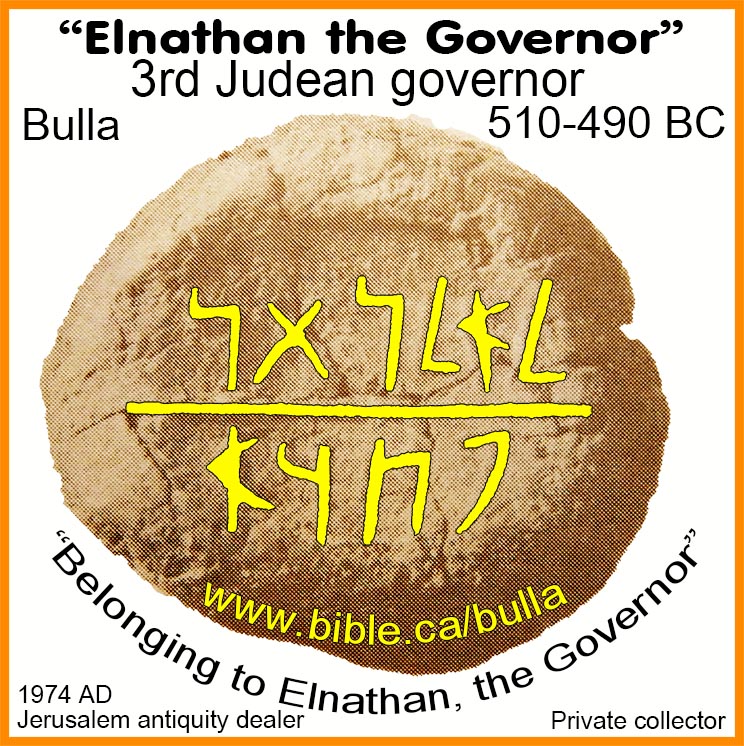
- Yehoʿezer: The forth Persian governor: 490-470 BC
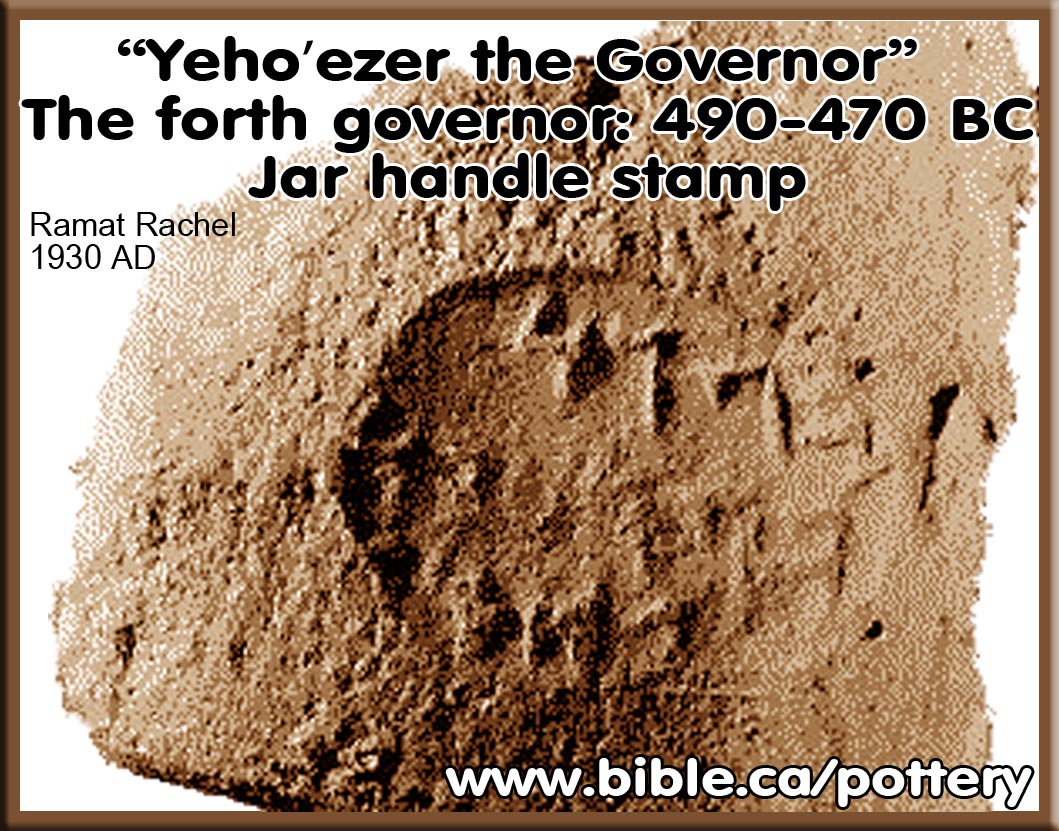
- Ahzai: The fifth Persian governor: 470-460 BC
- Nehemiah: The Seventh Persian governor: First term: 445-433 BC
- Bagohi: The eighth Persian governor: 406 BC
- Yehezqiyah
"Hezekiah": Last Persian Governor of Judea: 350-333 BC
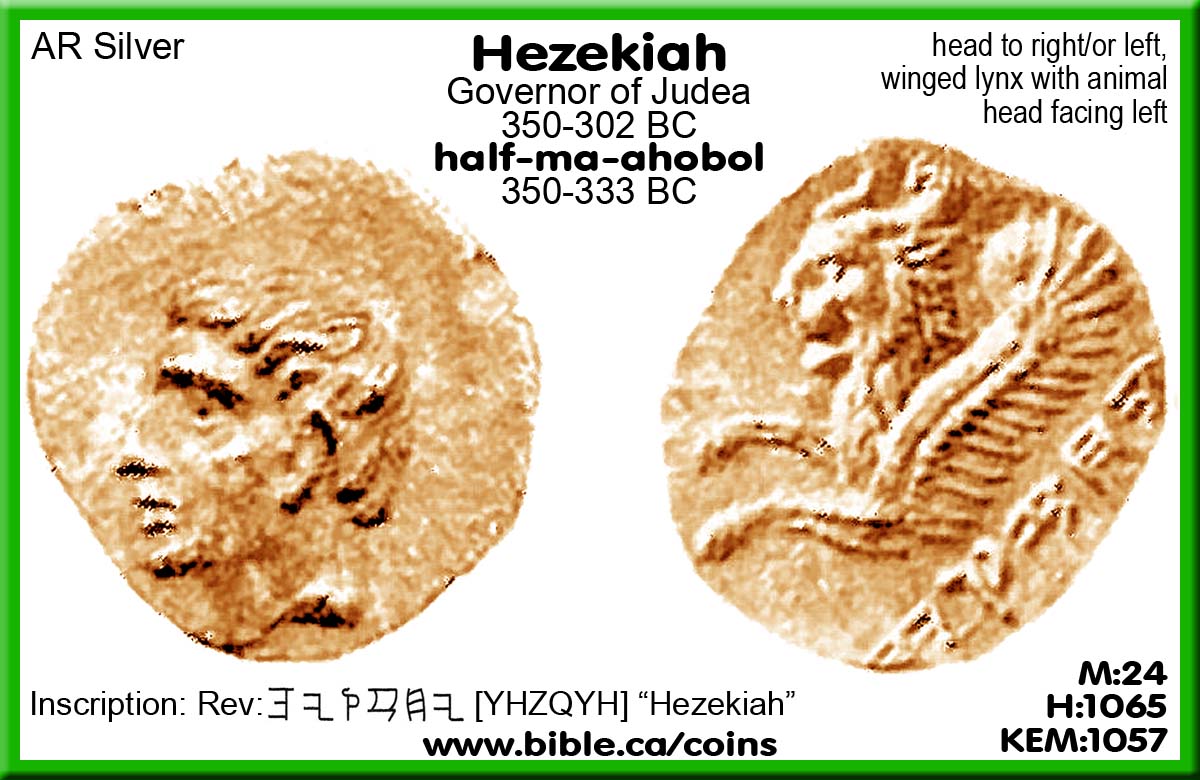
- Some of the Governors during the Roman era include: (King Herod’s successors minted coins, including Herod Archelaus, Antipas, Philip II, Agrippa I, Herod of Chalcis, and Agrippa II.)
|
Made king in 37-41 AD, then both king and governor for 2 years after Marullus: 41-43 AD when Herod Agrippa I was eaten by worms in Acts 12. |
- Cuspius Fadus (44-46 AD)
- Tiberius Alexander (46-48 AD)
- Cumanus (48-52 AD)
- Antonius Felix (52-57 AD)

- Porcius Festus (57-62 AD)
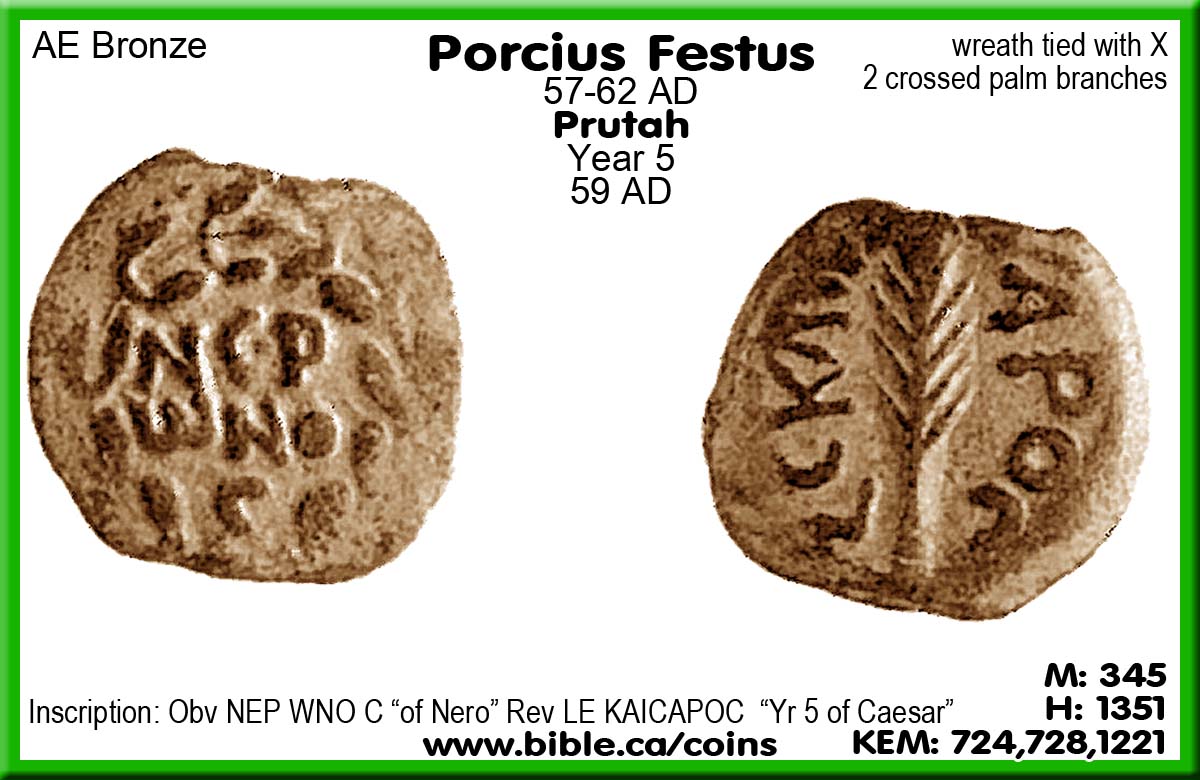
- Albinus (62-64 AD)
- Gessius Florus (64-66 AD)
- 66-70 AD the first Jewish revolt broke out and thus ended the Governors of Judea.
- First Jewish war Prutah: 66-69 AD
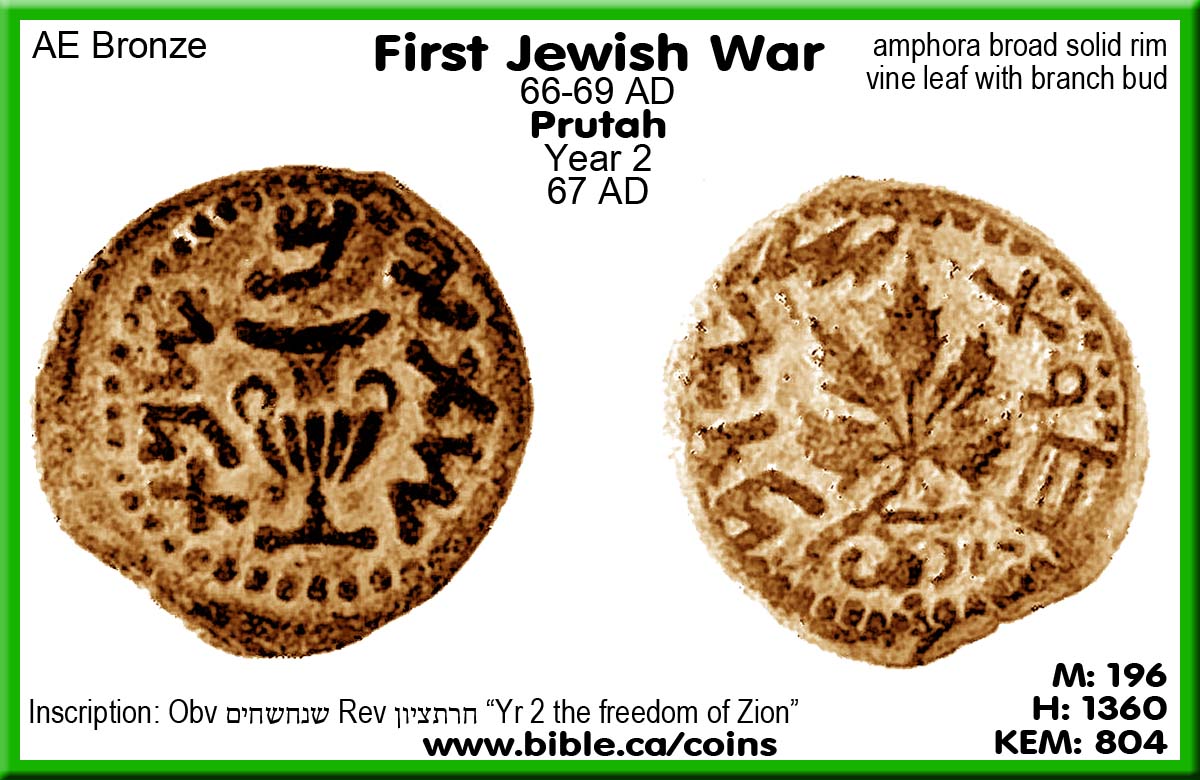
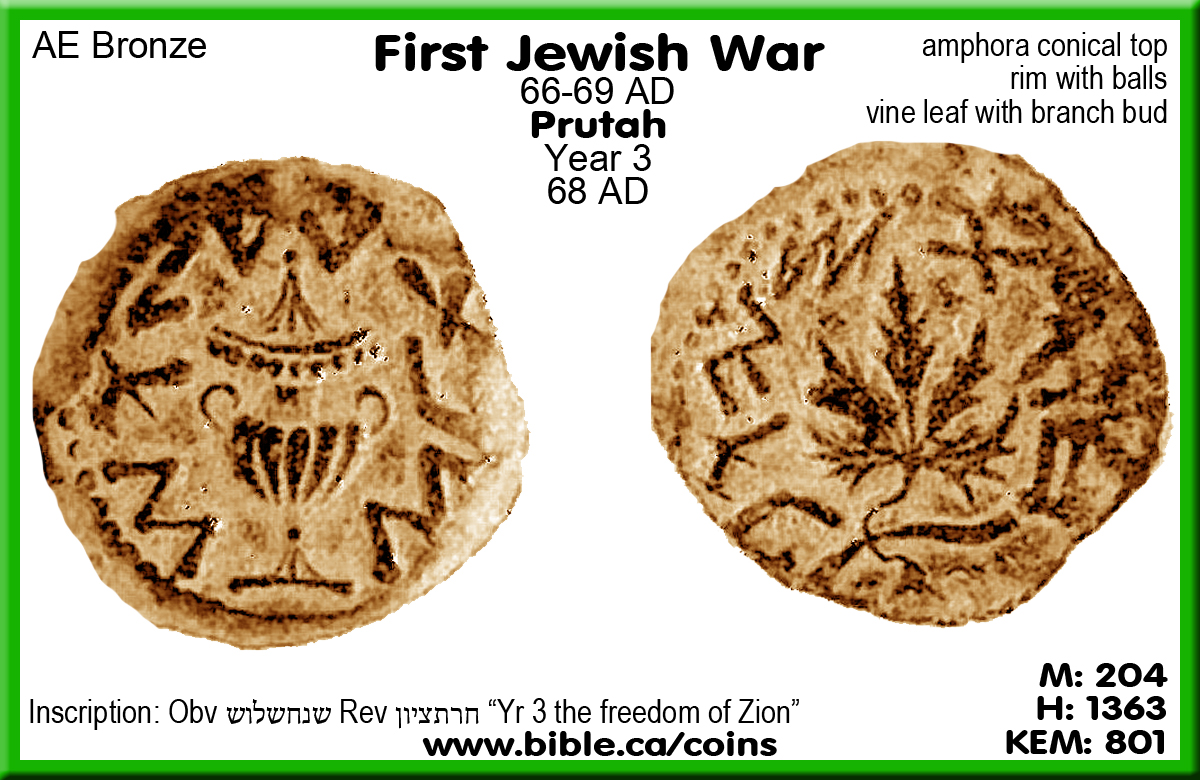
- Jerusalem was destroyed by Titus in 70 AD ending the Jewish nation.
- Simon bar Kokhba:
Second Jewish war: 132-135 AD.
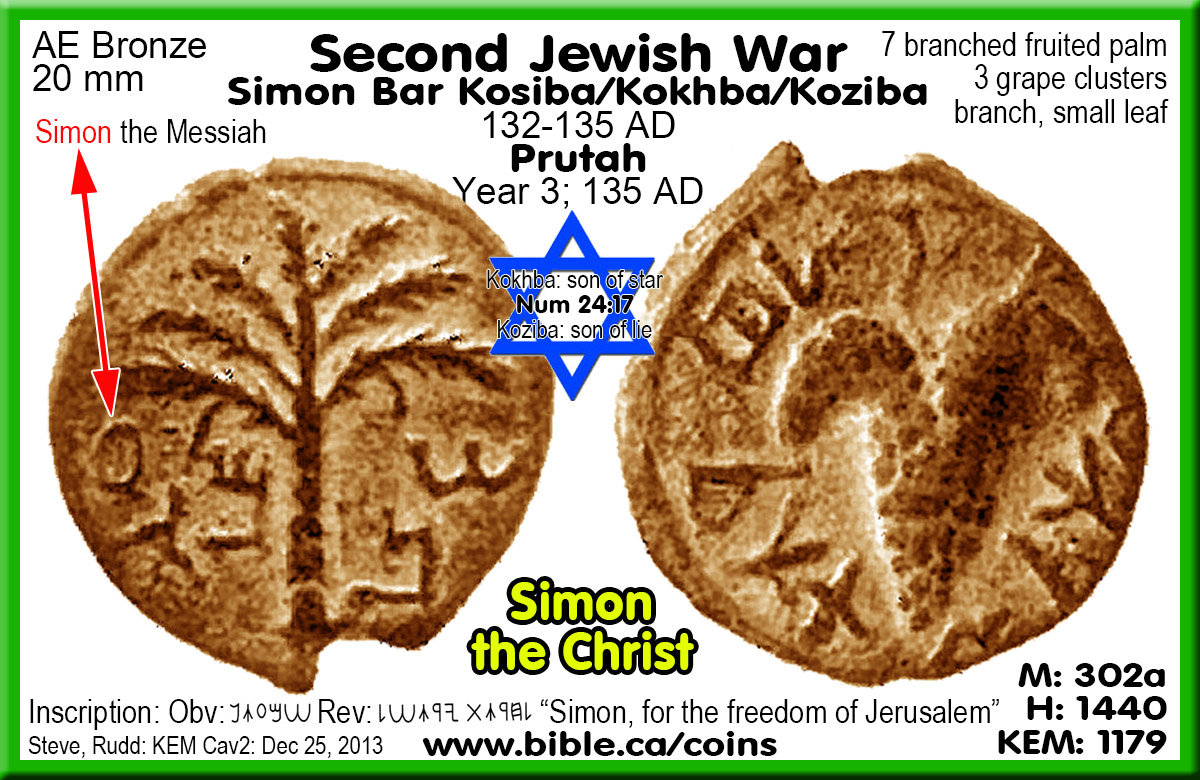
His actual name was "Simon bar Kosiba/Koseba" but Rabbi Akiba/Akiva called him "bar Kokhba" meaning "son of the star" which directly ties him as the messiah to "There shall step forth a star out of Jacob, and a scepter shall rise out of Israel" (Num 24:17). The name Bar Kokhba does not appear in the Talmud but in ecclesiastical sources. However, after he was defeated, the Jews started calling him "bar Koziba" meaning "son of the lie". Simon bar Kosiba/Kokhba was the first post-70 AD "president" of Israel who all the Jews believed to be the Messiah of prophecy who would liberate Israel from underneath Roman control. "Simon bar Kosiba, President over Israel, to Yehonathan and Masabala, peace. [My order is] that you search and seize the wheat which is in the possession of Hanun (Bar Kokhba's Letters, The Wooden Letter) They were sadly mistaken in rejecting Jesus Christ as their true Messiah whom they crucified and even more mistaken in their false faith in Simon as the Messiah. Three ancient authentic sources (7th century, one 8th) that show that the significant portion of the Jewish community initially viewed Muhammad as the messiah, just as they did Bar Kokhba in 135 AD. The Jews only realized Bar Kokhba was false after he was defeated and Akiva's disciple, Yose ben Halaphta changed his name from "son of the star" to "the son of lies". The Jews only realized Muhammad was not their messiah when he ate non-kosher camel meat and the attack on the Jewish oasis of Khaybar in 628 AD. "Contrary to the widely held view that the Aramaic word Kazab is "falsehood", and all examples cited from rabbinic literature have the meaning of lie, deception, or falsehood. In modern Hebrew, the usual meaning of kazab is "lie", although it can also take the meaning of "disappointment." But any attempt to translate "bar Kozeba" as "son of the disappointment" would be forcing a meaning from a modern language onto a similar word in a different language and from a different millennium." (Rodger Young). "In rabbinic writings the s in the name [bar Kosiba] is usually changed to a z (bar Koziba), implying in derogatory fashion that Simon was regarded as “the son of a lie” (i.e., a liar)." (ABD, Bar Kokhba). The Talmud always translates his name "Simon bar Koziba" (בר כוזיבא) or "Simon Bar Kozevah" (בר כוזבה)." The Babyonian Talmud says: "Bar Koziba ruled for two and a half years. He said to rabbis, “I am the Messiah.” They said to him, “In the case of the Messiah it is written that he smells a man and judges. Let us see whether you can smell a man and judge.” When they saw that he could not smell a man and judge, they killed him." (Babylonian Talmud, b. Sanh. 11:1, I.46.V–X) - Hadrian 135 AD: Jews expelled from Judah, temple of Jupiter built on temple mount in Jerusalem, Judah renamed "Palestine" after the historic enemies of the Jews, the Philistines.
VI. Six archeological finds connected with the Assassination of Gedaliah:
|
|
|||||
|
The assassination of Gedaliah, 1st governor of Judah 587 BC 2 Kings 25:22; Jeremiah 40:13–41:4 |
|||||
|
The reading of the text matches the archeology in the ground |
|||||
- We have the bulla of Gedaliah, the governor whom Baalis assassinated through Ishmael.
- See
outline on Gedaliah
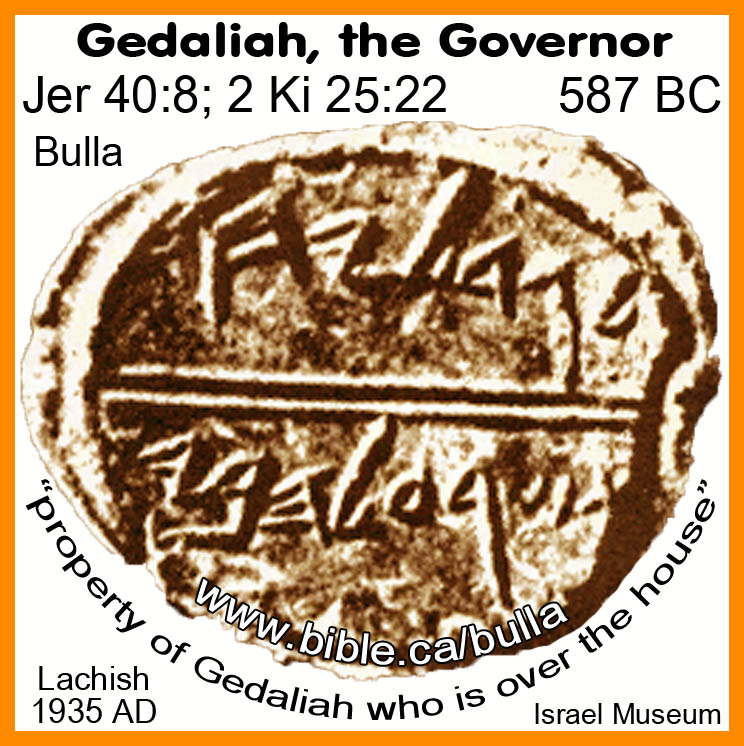
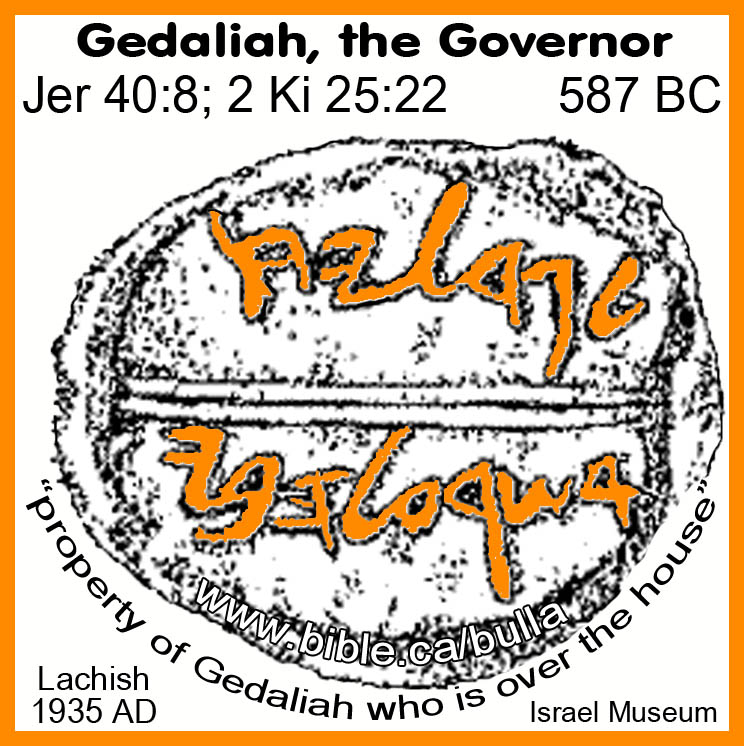
- This stunning find at Lachish in the 1935 archeological season is a prize for Bible students.
- "Now as for the people who were left in the land of Judah, whom Nebuchadnezzar king of Babylon had left, he appointed Gedaliah the son of Ahikam, the son of Shaphan over them." (2 Kings 25:22)
- We have found four seals from one bible verse: "So they came to Gedaliah at Mizpah, along with Ishmael the son of Nethaniah, and Johanan and Jonathan the sons of Kareah, and Seraiah the son of Tanhumeth, and the sons of Ephai the Netophathite, and Jezaniah the son of the Maacathite, both they and their men." (Jeremiah 40:8)
- "Another important seal impression was found at Lachish in 1935 by the Welcome Archaeological Expedition of England. The inscription on it reads, “Belonging to Gedaliah, the one who is over the house,” and the reverse side shows the marks of a papyrus roll to which it had been stuck. In other words it was Gedaliah’s personal seal to a letter or official document which he had just written. Since the impression is dated by its archaeological context to the very end of the Divided monarchy, we are safe in assuming that Gedaliah is the same person who was the friend of Jeremiah (Jer. 39:14 and 40:1ff.) and whom Nebuchadnezzar made governor of Judah after the destruction of Jerusalem in 586 B.C. (II Kings 25:22). The title which he bore, “the one who is over the house,” was always used to designate one of the highest royal officials (cf. Gen. 43:16 where in the Hebrew the office of Joseph’s “steward” is described in the same way, and Isaiah 22:15 where the phrase is applied to an official of Hezekiah). Perhaps “Governor of the Palace” would be a fairly accurate translation of the title. Gedaliah himself must have been well trained for his position, for his grandfather, Shaphan, was also a royal official—the scribe or secretary of King Josiah." (Biblical Archeologist, Some Personal Seals of Judean Royal Officials, G. Ernest Wright, Vol 1)
- "The nearby city fortress of Lachish provides clear proof that it had been twice burned over a short period of time, coinciding with the two captures of Jerusalem. In Lachish the imprint of a clay seal was found, its back still shows the fibers of the papyrus to which it had been attached. It reads: “The property of Gedaliah who is over the house.” We meet this distinguished individual in 2 Kings 25:22, where we are told: “And as for the people that remained in the land of Judah, whom Nebuchadnezzar king of Babylon had left, even over them he made Gedaliah…ruler.” (Elder, John. Prophets, Idols, and Diggers. New York: Bobbs-Merrill, 1960 108, 109), (Evidence for Christianity, Josh McDowell, p164, 2006 AD)
- We have the bulla of Ishmael "the king's son" (of Solomon through Bathsheba), who was hired by Baalis to kill Gedaliah in Jer 41:1.
- See
outline on Ishmael
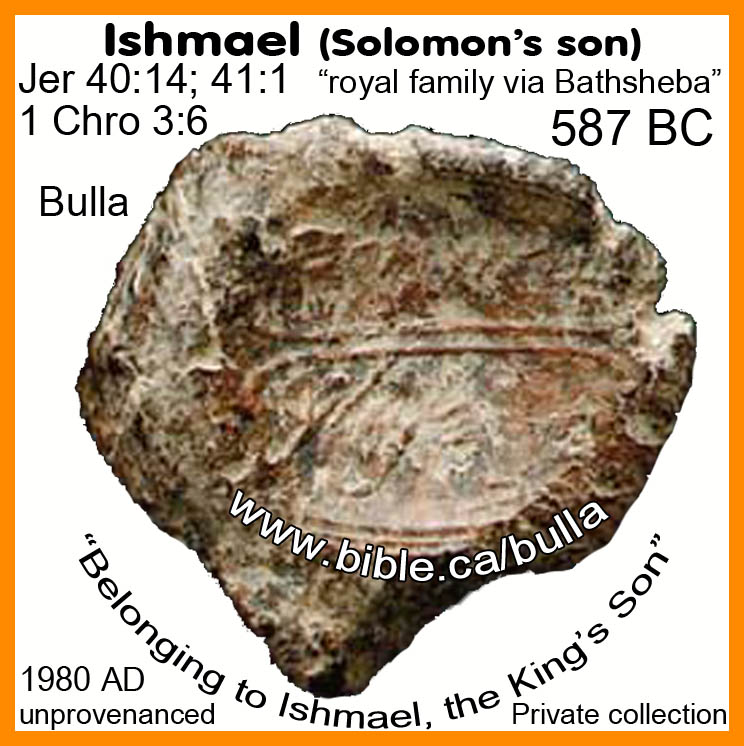

- Ishmael had disobeyed the prophet Jeremiah in surrendering to Nebuchadnezzar as Daniel had in 605 BC. He fled to Ammon likely around the same time and had lived with Baalis for 8 years. He was also a son of David and Bathsheba, who must have had intentions to take over as the new king of Judah in place of Gedaliah, who was not a son of David or of Royal descent. Add to this the fact that the Jews who left Ammon to be repatriated to Judah would have caused serious financial costs to Baalis.
- Baalis had likely made a deal with Ishmael that if he brought back the Jews who were living in Ammon that Baalis would support his bid to be king in place of Gedaliah.
- Three bullae have been found from this one Bible verse: “Are you well aware that Baalis the king of the sons of Ammon has sent Ishmael the son of Nethaniah to take your life?” But Gedaliah the son of Ahikam did not believe them." (Jeremiah 40:14)
- "In the seventh month Ishmael the son of Nethaniah, the son of Elishama, of the royal family and one of the chief officers of the king, along with ten men, came to Mizpah to Gedaliah the son of Ahikam. While they were eating bread together there in Mizpah," (Jeremiah 41:1)
- From the text is seems clear that Nethaniah was the direct father of Ishmael and that Elishama was the distant "father" whose name immediately connected Ishmael to the royal family. Elishama would be a known clan of the sons of David. Just as sons of Aaron formed three priestly clans, so to the sons of David formed separate well known clans.
- David and Bathsheba had two sons named Elishama: "These were born to David in Jerusalem: Shimea, Shobab, Nathan and Solomon, four, by Bath-shua (Bathsheba) the daughter of Ammiel; and Ibhar, Elishama, Eliphelet, Nogah, Nepheg and Japhia, Elishama, Eliada and Eliphelet, nine." (1 Chron 3:5-8)
- We have the seal of Baalis king of Ammon who hired Ishmael to assassinate Gedaliah in Jer 40:14.
- See
outline on Baalis
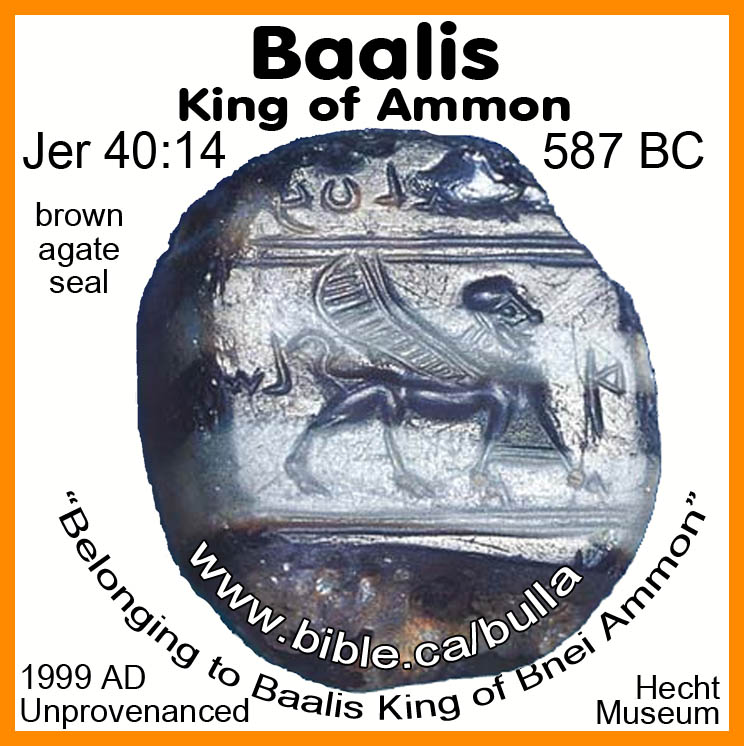
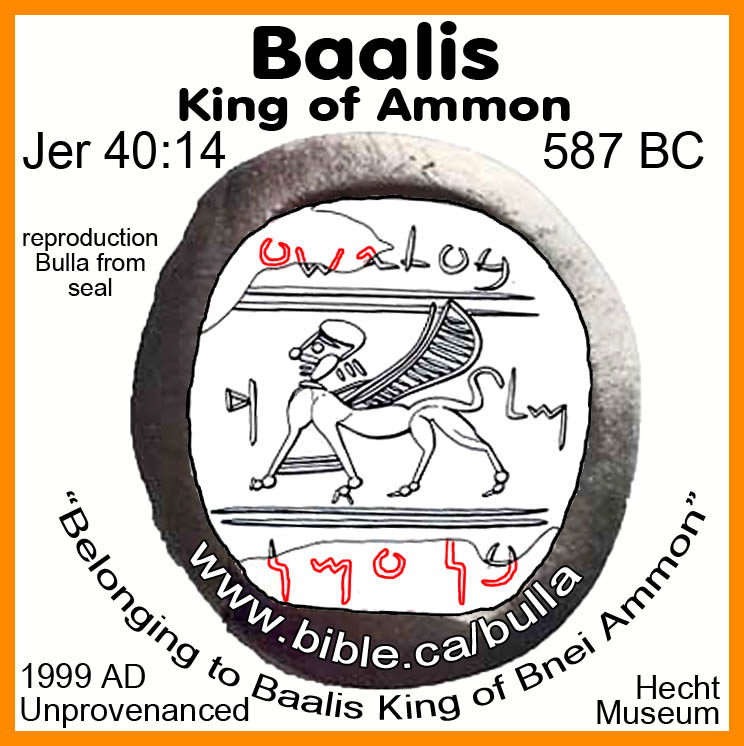
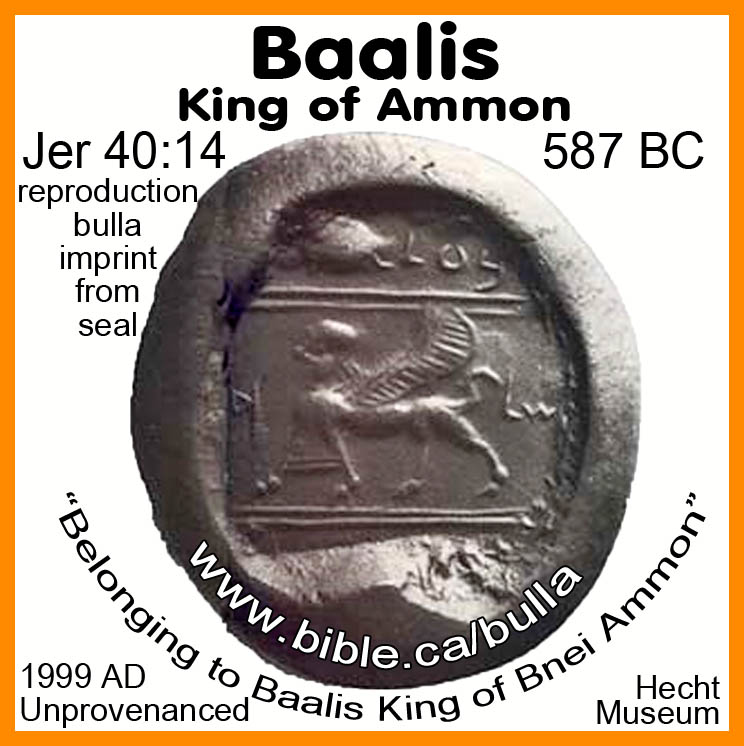
Line 1: [ע]בעלישׁ[לְ] ([l]b‘lyš[‘]) “[Belonging to] Ba‘ališ[‘]”
Line 2: מלך (ml/k) “King of”
Line 3: ן[נעם]ב (b[n’m]n) “B[nei Ammo]n.” - Baalas wanted to kill Gedaliah because the he was prospering with the new Jewish population who had immigrated to Ammon between 605-587 BC. Now they were leaving to come home and this was costing Baalas money, power and prestige. "Likewise, also all the Jews who were in Moab and among the sons of Ammon and in Edom and who were in all the other countries, heard that the king of Babylon had left a remnant for Judah, and that he had appointed over them Gedaliah the son of Ahikam, the son of Shaphan. Then all the Jews returned from all the places to which they had been driven away and came to the land of Judah, to Gedaliah at Mizpah, and gathered in wine and summer fruit in great abundance." (Jeremiah 40:11–12)
- Notice that after Ishmael killed Gedaliah, that he was preparing to take the repatriated Jews who had been living in Ammon, back to Baalis!
- Baalas is the king of Ammon who succeeded in assassinating Gedaliah. Baalas is mentioned by name in one Bible verse: "Now Johanan the son of Kareah and all the commanders of the forces that were in the field came to Gedaliah at Mizpah and said to him, “Are you well aware that Baalis the king of the sons of Ammon has sent Ishmael the son of Nethaniah to take your life?” But Gedaliah the son of Ahikam did not believe them." (Jeremiah 40:13-14)
- King Baalis is unknown from any outside written sources except the Bible which caused bible scoffers to once again, accuse God of making errors in the Bible. The discovery of the this Baalis seal and the bulla of Milkom servant of Baalis silenced the Bible haters once again! Outline on Milkom
- "What makes this seal especially exciting is that the king who owned the seal, a certain Ba‘alis, is also referred to in the Bible. When the Babylonians conquered Judah in the early sixth century B.C.E. and destroyed Jerusalem, they made Gedaliah, who was from a prominent Jerusalem family, governor of Judah. Gedaliah, however, was soon murdered, an event still commemorated in Jewish tradition by a yearly fast. The assassin was sent by none other than Ba‘alis, king of the Ammonites (Jeremiah 40:13–41:2). Ba‘alis’s seal (shown on the cover of this issue; the seal impression appears below) is made of brown agate with white bands and is in fact quite tiny (.5 inches in diameter and .2 inches thick). A small hole was drilled through the center of the scarab-shaped seal for the setting. On the seal are three lines of script, each separated by double rules:" (Seal of Ba‘alis Surfaces, Ammonite king plotted murder of Judahite governor, Robert Deutsch, BAR 25:02, 1999 AD)
- We have the Bulla of Milkom (Molech) servant of Baalis (Baal).
- See
outline on Milkom
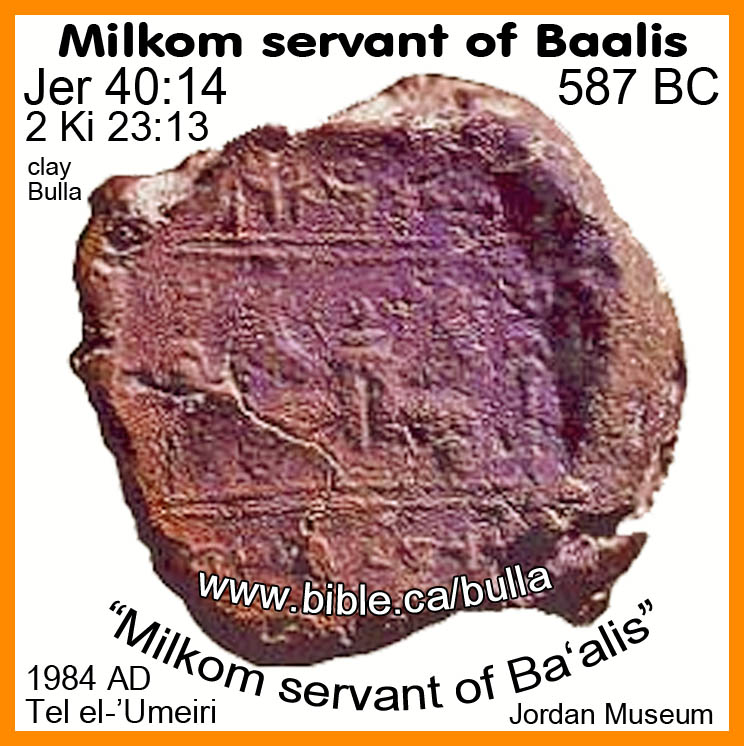
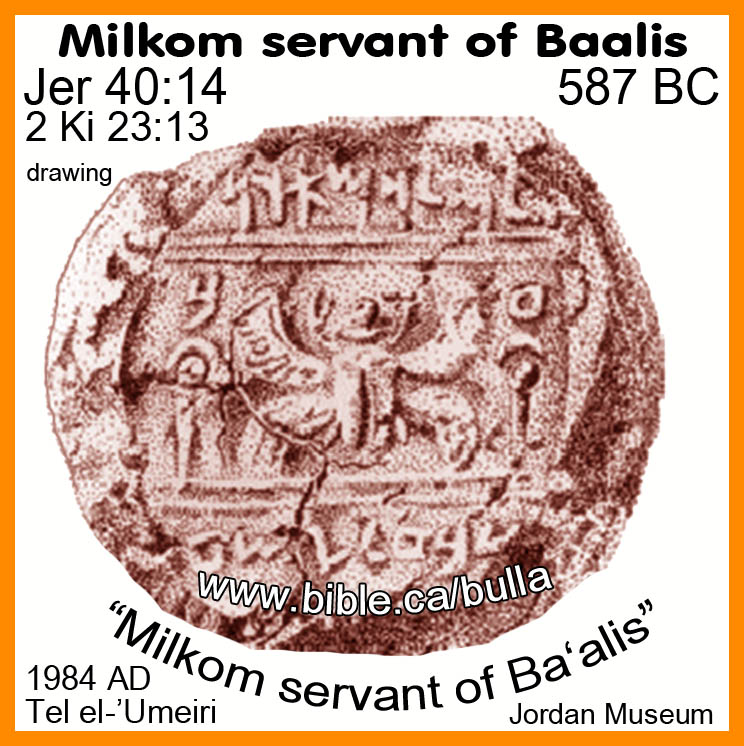
- It is likely that Milkon was part of the assassination plot against Gedaliah. He may have initiated it, planned it or help execute it. He certainly must have known about it given he lived at the same time.
- The importance of this bulla is not that Milkom himself is directly associated with the but that it is the second archeological source that confirms Ba'alis was in fact a real king of Ammon, contrary to the now silenced chortlings of Bible trashers who used the absence of evidence to say the Bible just made Baalis up like mother goose.
- Both men's names on the bulla are of pagan gods: Milkom =Molech and Baalis =Baal.
- Although there is no man in the Bible named Milkom, it is another name for Molech, the idol god of the Ammonites. Just as Muslims name their fourth child, Muhammed-Muhammed-Muhammed-ABU-Muhammed, so too men would historically name their children after pagan gods. Here we have man named after the idol Molech who is the servant of Baalis who is named after the idol Baal.
- King Baalis is unknown from any outside written sources except the Bible which caused bible scoffers to once again, accuse God of making errors in the Bible. The discovery of the this Baalis seal and the bulla of Milkom servant of Baalis silenced the Bible haters once again! Outline on Baalis
- "Then Solomon built a high place for Chemosh the detestable idol of Moab, on the mountain which is east of Jerusalem, and for Molech the detestable idol of the sons of Ammon." (1 Kings 11:7)
- "When Jephthah subdued the Ammonites, “he smote them … as far as Abel-keramim” (Judges 11:33), whose ruins today constitute Tell el ‘Umeiri, a Jordanian site about 37 miles east of Jerusalem. Occupied from about 3000 B.C. to nearly 500 B.C., the site has been linked with the Ammonite king Baalis (Jeremiah 40:14) and with Pharaoh Thutmose III (1479–1425 B.C.). In past seasons, excavators have found an early sixth-century B.C. bulla with the inscription, “Belonging to Milkom-or, the servant of Baalyasha” (the Baalis of Jeremiah 40:14), and a jar handle stamped with the cartouche of Thutmose III." (Tell el ‘Umeiri-Madaba Plains Project, BAR 14:06, 1988 AD)
- "This king [Baalis] has been identified with the Baʿal-yishʿa mentioned on a seal impression found in 1984 at Tell el-ʿUmeiri, just S of Amman in Jordan (Geraty 1984; 1985). It was found in the sift from topsoil excavated near the W rim of the mound about 50 cm above the remains of a major public structure termed the Ammonite Citadel by the excavators. The seal impression itself (19 mm in diameter) was on the flat end of a fired ceramic cone (21 mm in length) which may have served as a stopper with identification for a juglet of unknown contents. The finely conceived and executed seal impression is divided into 3 panels. The top and bottom panels contain the Ammonite inscription, dated paleographically to ca. 600 b.c. (Herr 1985b and fc.). The middle panel depicts typically Ammonite iconography (Younker 1985): a 4-winged scarab beetle pushing a solar ball flanked by standards, solar discs, and crescent moons in an assemblage reminiscent of Zeph 1:4–6. The inscription reads lmlkm-ʾwr ʿbd bʿl-yšʿ, “belonging to Milkom-ʾur, servant of Baʿal-yishʿa (or Baʿal-yashaʿ).” Both of the personal names, that of the owner of the seal and that of the king he served, constitute “firsts.” Milkom-ʾor (“Milkom is light”) or Milkom-ʾur (“Milkom’s flame”), represents the first-known occurrence in which Milkom, the well-known Ammonite divine name, appears as one of the elements in an Ammonite proper name. According to his title, “servant,” this individual would have been a prominent government official in the service of the Ammonite king, Baʿal-yishʿa (“Baal is salvation”) or Baʿal-yashaʿ (“Baal saves”). The latter is identified with the Baalis of Jer 40:14, and this reference to him is his first extrabiblical confirmation". (ABD, Baalis)
- We have the seal of Jaazaniah servant of the king who helped assassinate Gedaliah.
- See
outline on Jaazaniah
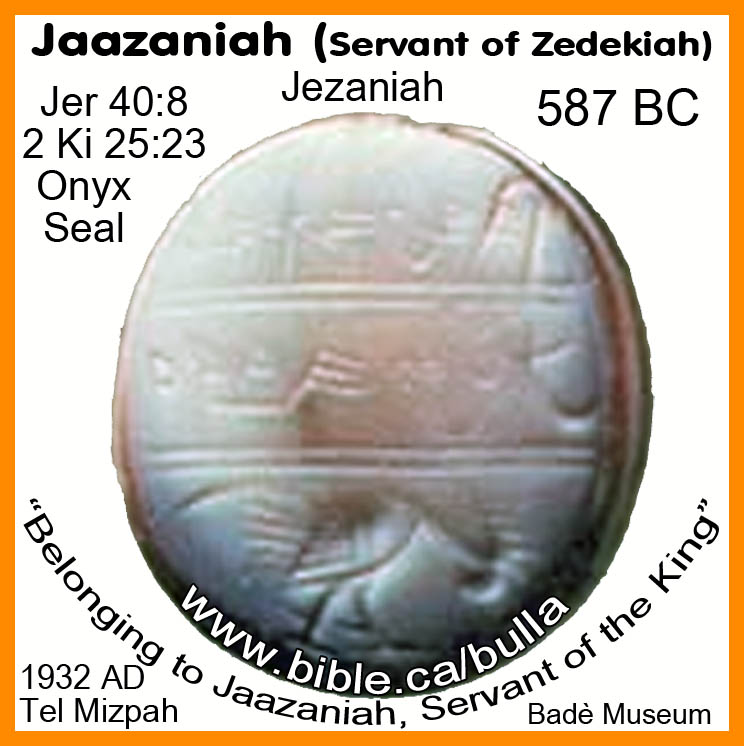
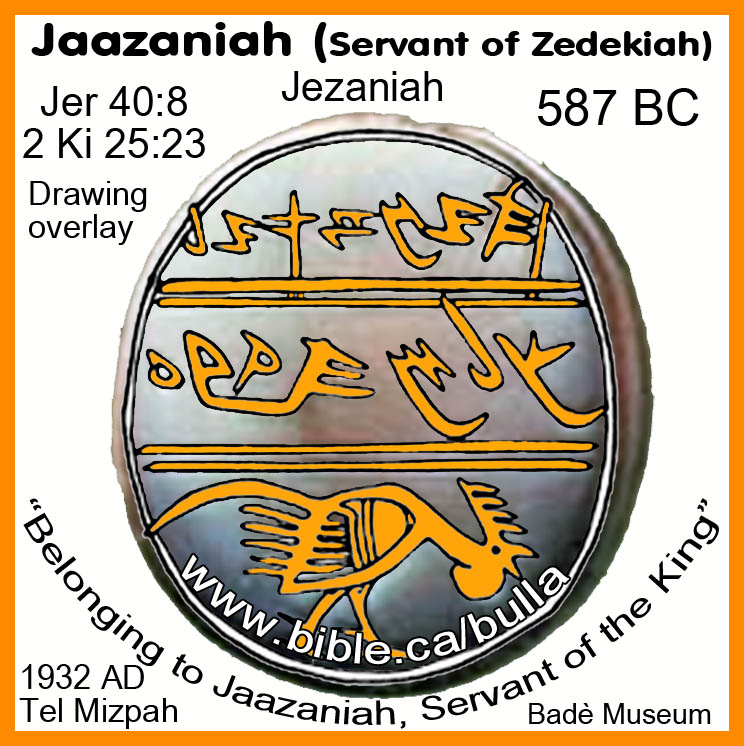
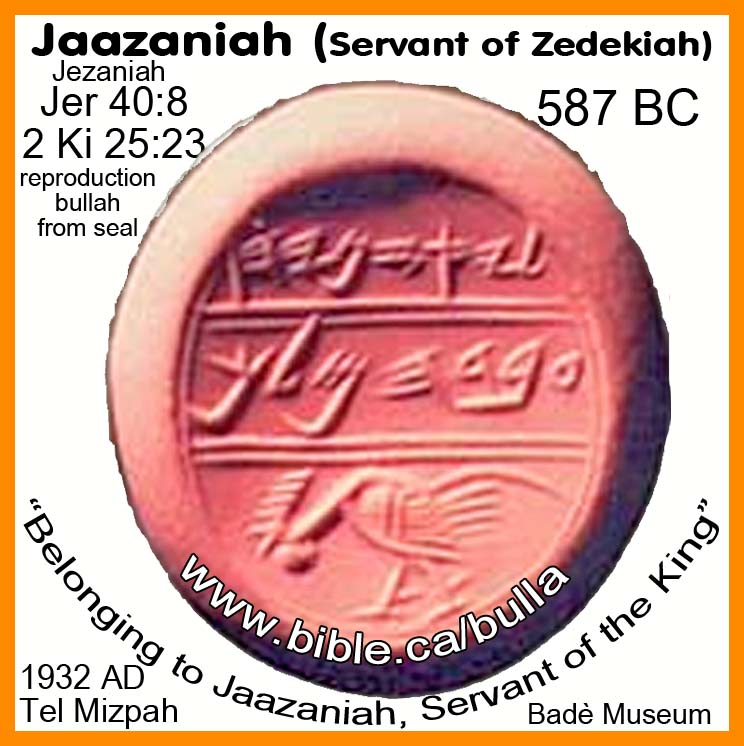
- "When all the captains of the forces, they and their men, heard that the king of Babylon had appointed Gedaliah governor, they came to Gedaliah to Mizpah, namely, Ishmael the son of Nethaniah, and Johanan the son of Kareah, and Seraiah the son of Tanhumeth the Netophathite, and Jaazaniah the son of the Maacathite, they and their men." (2 Kings 25:23)
- "So they came to Gedaliah at Mizpah, along with Ishmael the son of Nethaniah, and Johanan and Jonathan the sons of Kareah, and Seraiah the son of Tanhumeth, and the sons of Ephai the Netophathite, and Jezaniah the son of the Maacathite, both they and their men." (Jeremiah 40:8)
- "In the ruins of Tell en-Naṣbeh (Mizpah?) a seal was found bearing the identifying inscription “To Jaazaniah, servant of the king.” Jaazaniah was one of the officials associated with Gedaliah (2 K. 25:23; Jer. 40:8). A seal impression found among the ruins of Lachish (thus antedating its destruction) bears the inscription, “Gedaliah who is over the house.” Thus G. Ernest Wright (WBA, p. 181) suggests that Gedaliah had served as one of the last prime ministers of Judah, because the words “who is over the house” refer to the office of prime minister. Not only was Gedaliah’s father a high official in his own right (Jer. 26:24), but his grandfather Shaphan had served Josiah as scribe, or secretary of state (2 K. 22:3, 8–12)." (ISBE, Rule of Gedaliah, Volume 2, Page 919, 1979 AD)
- Since this seal was found at tel Mizpah,
it seems obvious to associate this Jaazaniah with the Gedaliah the first
governor of Judah who used Mizpah as his home city. (2 Ki 25:23; Jer
40:8)
Jaazaniah was in Mizpah at the same time as Gedaliah
Jaazaniah was called the servant of the king and since Gedaliah was NEVER called a KING and since
Jaananiah was hostile to Gedaliah and part of the assassination plot.
Therefore it makes perfect sense that Jaazaniah served king Zedekiah. - The Bulla of Miamen Son of Ephai, son of a Maachathite who helped assassinate Gedaliah.
- See
outline on Miamen

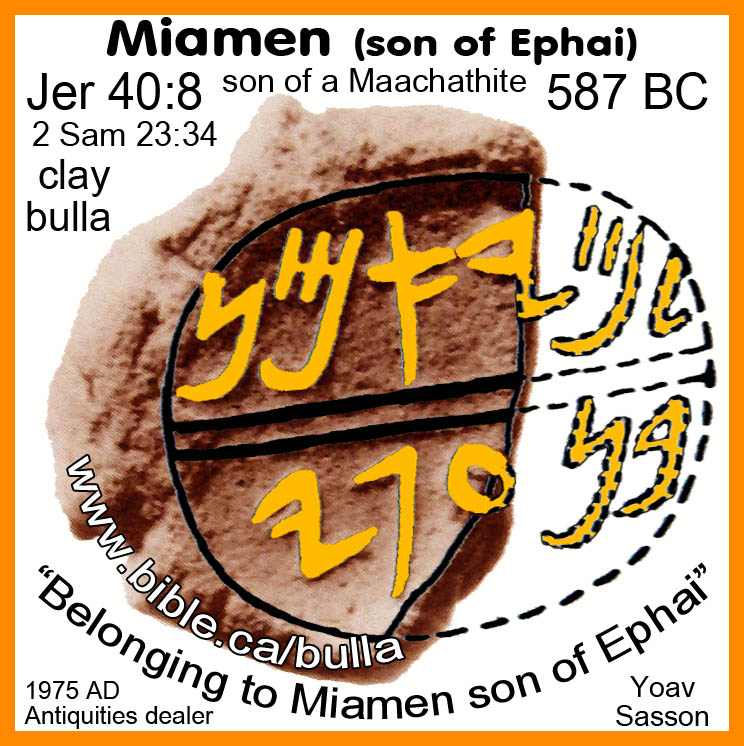
- Miamen is not named in the Bible but the sons of Ephai were part of the assassination plot headed by Ishmael to kill Gedaliah.
- The "sons of Ephai" are named in the Bible: "So they came to Gedaliah at Mizpah, along with Ishmael the son of Nethaniah, and Johanan and Jonathan the sons of Kareah, and Seraiah the son of Tanhumeth, and the sons of Ephai the Netophathite, and Jezaniah the son of the Maacathite, both they and their men." (Jeremiah 40:8)
- This bulla came from the 255 bullae that
surfaced in 1975 AD:
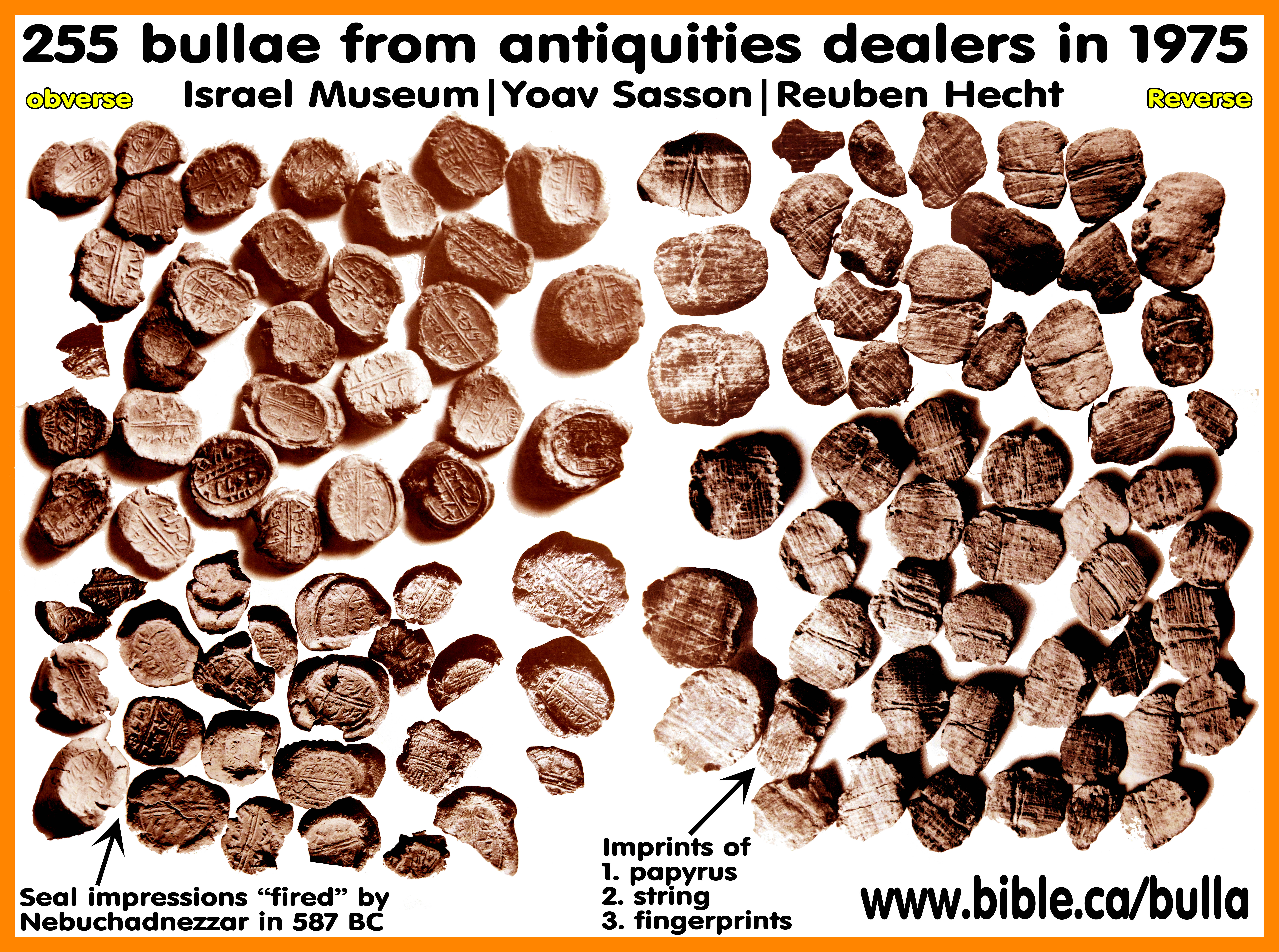
Conclusion:
- Gedaliah was the first in a long line of governors of Israel and Judah appointed by the four foreign powers: Babylon, Persia, Greece and Rome.
- The Bible gives us little details about these governors but archeology has actually helped us fill in the gaps and the details.
- While the Bible is all sufficient for life and godliness and we have all we need for salvation in the revealed word of God, archeology certainly does add new information we would not know otherwise. This information is not needed since we have the Bible, but it sure thrills the heart of the Christian to learn about it!
- The central theme surrounding the assassination of Gedaliah is the end of the house of David and the extinction of the throne of David on earth:
- The Holy Spirit went to great lengths to specifically highlight direct parallels between the triumph of the House of David over the House of Saul in 1010 BC and the extinction of the house of David in 587 BC with the appointment of Gedaliah as the first in a long line of vassal kings that endured down to 70 AD.
- "The connection of Gedaliah and Ishmael to Saul and David also accentuates the covenantal crisis created by the removal of the Davidic ruler from the throne. The narrator in Jer 40-41 suggests that the house of David experiences the same divine rejection that was the fate of the house of Saul (cf. 1 Sam 13:13-14; 15:1, 23, 26; 28:17), a startling and disturbing notion in light of Yahweh's original promise to David that this very thing would never happen (cf. 2 Sam 7:15-16; Ps 89:30-37). The Saul-David intertextuality adds to the shock value of the story of Gedaliah and Ishmael and magnifies the national import of this episode." (Ishmael's Assassination of Gedaliah: Echoes of the Saul-David Story in Jeremiah 40:7-41:18, Gary E. Yates, WT767, p112, 2005 AD)
- It is strange that Premillennialists reject that Jesus is a king sitting on the throne of David NOW in heaven, while wanting to restore an apostate earthly throne in Judah for a future time when Jesus can be king on earth.
- A future earthly throne of David on earth with Jesus sitting as king is a direct violation of God's own prophecy that no descendant of Coniah would ever be king in Judah again: "Thus says the Lord, ‘Write this man [Jeconiah/Coniah] down childless, A man who will not prosper in his days; For no man of his descendants will prosper Sitting on the throne of David Or ruling again in Judah.’ ”" (Jeremiah 22:30)
- Jesus was a direct descendant of Jeconiah/Coniah: Matthew 1:12, therefore Jesus could never be a king on earth in Judah.
- Premillennialism, therefore, fails to understand that the fact that an earthly throne never was God's will and he allowed Saul to replace Him as king only after a series of natural disasters impressed how angry God was in their asking for an earthly throne in the first place.
- Premillennialists need to mediate on this key verse: "I gave you a king in My anger And took him away in My wrath." (Hosea 13:11)
- God gave appointed Saul in his anger and made extinct, the earthly throne in 587 BC in his wrath.
- The throne of God from all eternity was in heaven. Then from the time of Saul to the time of Zedekiah God allowed the "Throne of God" to come down to earth.
- In 587 BC the throne of God was restored in God's wrath, ever again to be on earth.
- Jesus Christ was seated on the throne of David IN HEAVEN at his resurrection: Acts 2:29-36.
- Jesus is king NOW!
- Three times God calls Nebuchadnezzar "My Servant" (Jeremiah 25:9; 27:6; 43:10) and the appointment of Gedaliah was directly from God's will. In the same way Titus was the "Servant of YHWH" when the Romans destroyed Jerusalem in 70 AD.
- The Jews didn't like the idea of being bossed around by the Babylon king Nebuchadnezzar and they killed Gedaliah just like they killed the other righteous prophets of YHWH.
- Jesus Christ was the God appointed king of Israel whom they nailed to the cross.
- The murder of Gedaliah was the final act of disobedience and ended the kingdom of Judah forever!
- Had they listened to Jeremiah, Jerusalem would not have been destroyed by the Babylonians on the 10 Av 587 BC.
- Had they listened to Jesus, Jerusalem would not have been destroyed by the Romans on the 10 Av 70 AD.
- God sent a clear message in twice destroying Jerusalem on the exact same day of the year, 656 years apart.
- In the story of the assassination of
Gedaliah we have 6 bulla and seals in two Bible texts, from men directly
involved in this tragic story.
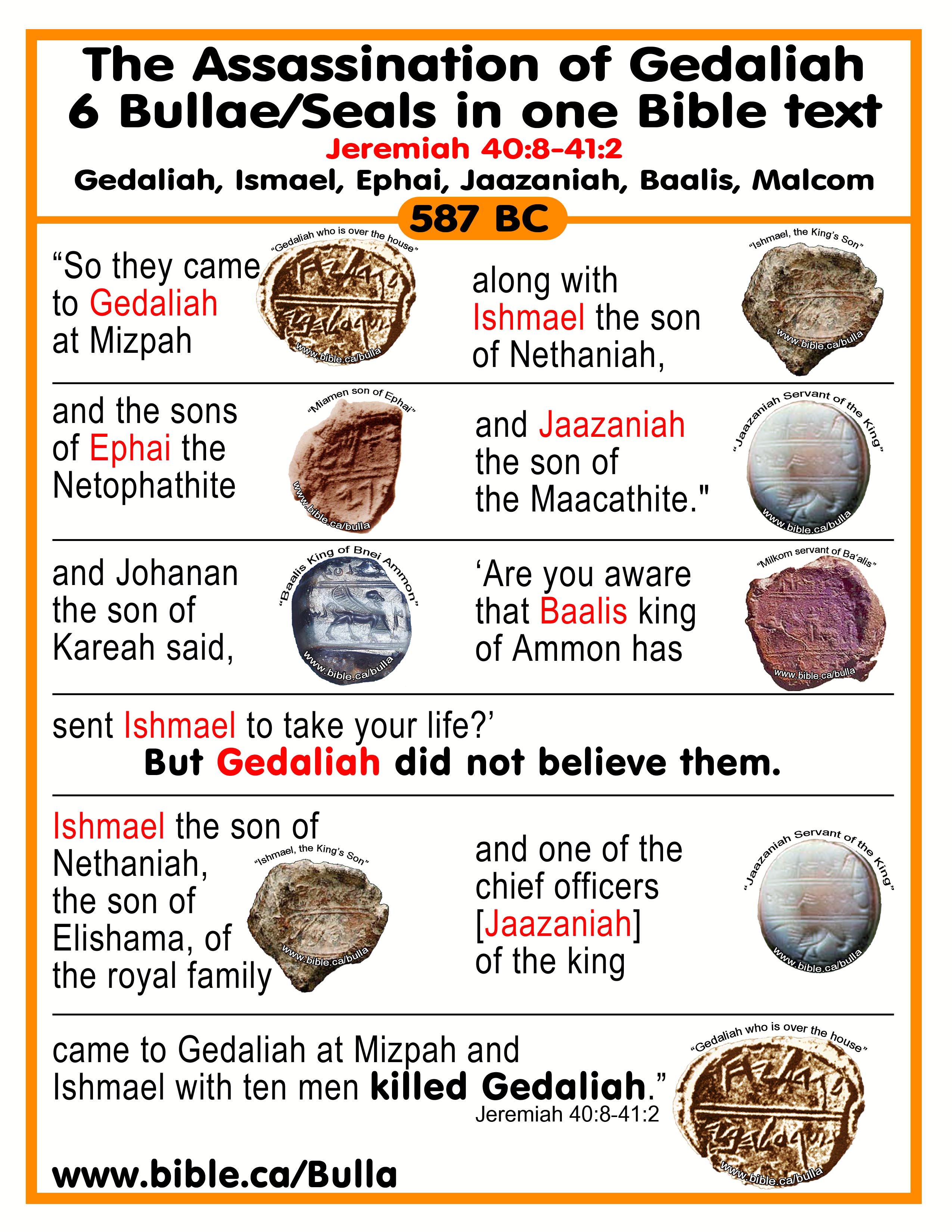
- The assassination of Gedaliah is a story of failure of the masses who twice disobeyed Jeremiah:
- First time Jeremiah commanded all to surrender to Nebuchadnezzar and be deported to Babylon or die.
- The disobedience hid in the fields, fled to foreign countries then surfaced after the Babylonians returned home thinking they were so smart to have NOT listened to Jeremiah.
- This same group then asked Jeremiah to pray for guidance and command from God for direction.
- Second time Jeremiah commanded them to NOT surrender to the Egyptians but to remain in Judah.
- They all ended up dying in exile in Egypt under the hands of Nebuchadnezzar in 582 BC just as Jeremiah had predicted.
- It seems God creates circumstances that only those who walk by faith can successfully navigate without harm.
- The remnant of Israel who survived to return again and rebuilt the city, therefore, was almost exclusively those who had the faith to voluntarily surrender to Nebuchadnezzar. All the rest were spiritual discards destined for destruction and extinction just like the 10 lost tribes experienced in 723 BC
- Those who did not obey God and surrender fled to Ammon or hid themselves in bunkers in the hills. When these returned, they were cursed because the very lack of faith that caused them to disobey Jeremiah's original order to surrender, led them to disobey Jeremiah's second order to NOT flee to Egypt but stay in Judah.
- Ishmael had a right to claim the throne of David but was not chosen by God to do so. His murder of Ishmael shows his black heart was only interested in self-preservation and power as a king.
- Johanan the son of Kareah was Zedekiah's failed army general and a coward who chose to hide from the Babylonians rather than fight in the same way Captain Francesco Schettino abandoned 300 passengers aboard the sinking Costa Concordia in 2012 AD. He came out of hiding and made himself look like a hero by warning Gedaliah of his impending death then repelling Ishmael back to Ammon and rescuing the captured daughters of the king destined to be sold as slaves to Baalis. But in the end he was also a black heart to lead the people to death in Egypt.
- Johanan may have spoken these very words to Jeremiah in Egypt: “As for the message that you have spoken to us in the name of the Lord, we are not going to listen to you! “But rather we will certainly carry out every word that has proceeded from our mouths, by burning sacrifices to the queen of heaven and pouring out drink offerings to her, just as we ourselves, our forefathers, our kings and our princes did in the cities of Judah and in the streets of Jerusalem; for then we had plenty of food and were well off and saw no misfortune. “But since we stopped burning sacrifices to the queen of heaven and pouring out drink offerings to her, we have lacked everything and have met our end by the sword and by famine." (Jeremiah 44:16-19)
- The assassination of Gedaliah is a story of success of a tiny faithful remnant.
- Those who surrendered to Babylon never had to experience the horrific and terrifying destruction of the city or the witness the injustice of the murder of Gedaliah.
- When the Jews in Babylon did hear about the murder, they enacted a feast on the 7th month (Zechariah 7:3; 8:19) but today the fast is held on the 3rd of Tishri.
- It is a strange paradox that the Jews have been keeping a memorial feast day for the innocent slaughter of Gedaliah at the hands of his fellow Jews and they refuse to even acknowledge an even greater injustice in the crucifixion of the innocent, sinless the son of David, rightful heir to the throne of David, Jesus Christ.
- The faithful obeyed Jeremiah and lost all their worldly possessions but gained their "life as a booty".
- In the same way Jesus Christ calls upon us to surrender voluntarily to him, give up all our worldly possessions, pick up our cross and follow him in order to gain "eternal life" as our booty!
- Will you volunteer to surrender your life to Jesus who rose from the dead?
- Johanan called Jeremiah a liar (Jeremiah 43:2)
- Will you call God a liar when he says Jesus rose from the dead?
- "The Lord says to my Lord: “Sit at My right hand Until I make Your enemies a footstool for Your feet.” The Lord will stretch forth Your strong scepter from Zion, saying, “Rule in the midst of Your enemies.” Your people will volunteer freely in the day of Your power; In holy array, from the womb of the dawn, Your youth are to You as the dew." (Psalm 110:1–3)
By Steve Rudd: Contact the author for comments, input or corrections.
|
|
|||||
|
The assassination of Gedaliah, 1st governor of Judah 587 BC 2 Kings 25:22; Jeremiah 40:13–41:4 |
|||||
|
The reading of the text matches the archeology in the ground |
|||||
By Steve Rudd: Contact the author for comments, input or corrections.
